|
Chapter Nine: Sleepwalking (June-July 1945) Excerpt from The Revolutionary Marines: A History by Jeanette Hanlon No branch of the American military was more active than the Marines in the “war between the wars” period. Invasions of Western Britain, the Azores, and O’ahu dominated the headlines and made Generals Cates and Liffland into household names. But then they disappeared from the public eye. When the two Marine armies departed from Pearl Harbor in the early summer of 1945, the official word was that they were being deployed in “exercises.” What they actually were doing were taking the first step in America’s advance across the Pacific, with a variety of targets in the Marshall, Gilbert and Caroline island chains, all nominally controlled by the exiled Imperial Germans. The reason for secrecy was not because there was any great need for tactical surprise. The islands were defenseless. Rather the offensive into the area was rendered politically complicated by their ambiguous status with regards to the mandates for armed action laid down by the Chamber in Chicago. Compared to the campaigns in O’ahu and the Azores, which had clear relevance to widely accepted war aims, the Central Pacific advance had the potential to create political controversy on the home front. The Chamber, busy with various domestic and alliance concerns, had yet to come together to approve a clear mandate for prosecuting the war with Australasia. While the attack on the German held islands was legal under both the declaration of war against Germany and the wide mandate providing for the liberation of colonized areas, widespread public knowledge of American capture of these islands would lead to questions that the Gitlow administration had no answers for in June 1945. Firstly, was America committed to a full prosecution of war against Australasia? And secondly, what were American plans for socialist self-government for the Pacific islands? The Gitlow administration had no answers at this point. At the same time, none of the decision makers wanted to give either Australasia or Japan an opportunity to make their own play on the islands now that the capture of O’ahu turned all eyes to the Pacific. A quiet and unemphasized seizure of key base islands would serve to tighten the noose around Australasia, deny Japan an opportunity to expand their empire, and avoid adding a new combustible element to an already complicated political situation in Chicago.  Keeping the campaign out of the headlines proved to be easy, since there were no real battles and little in the way of casualties. The first island captured was Eniwetok, a small and flat atoll essentially equidistant from Honolulu and Brisbane. The island contained an airfield and anchorage, though no German defenders, as they had long since been pulled back to New Guinea. 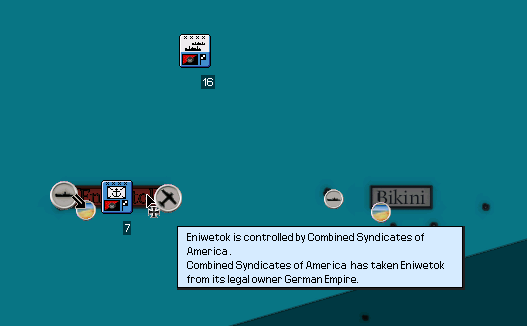 General Liffland found himself in a position of being the ruling authority of the liberated island. The Foreign Ministry typically issued guidance to commanders in the field on what they should do with regards to laying the groundwork for future self-government in liberated formerly colonial areas. Without any real knowledge of the local politics in Germany’s Pacific colonies, and no contacts with a local resistance that could form the basis of a new government, the Ministry told the Marines to “exercise best judgment.” In the case of Eniwetok, this resulted in Liffland signing an agreement with the traditional chiefs of the island for temporary access to the airfield and anchorage, in exchange for developmental aid, the nature of which would be determined later. This ad hoc agreement of convenience would become the blueprint for future Marine diplomacy with other island communities, and eventually form the basis of most future American involvement in Oceania.  The campaign to seize German positions in the Pacific encountered its first resistance eight days after it began, and it didn’t even come from Germans. An Australasian bombing raid targeted the anchorage at Eniwetok. The raid was carried by a few bombers inexperienced in harbor raiding, and it killed nobody and did minor damage. The Gitlow administration fretted that news of the occupation would leak out to the American public through the Australasian press. However, it turned out that the Australasian government was just as keen to push the American advance under the rug as the American government was. 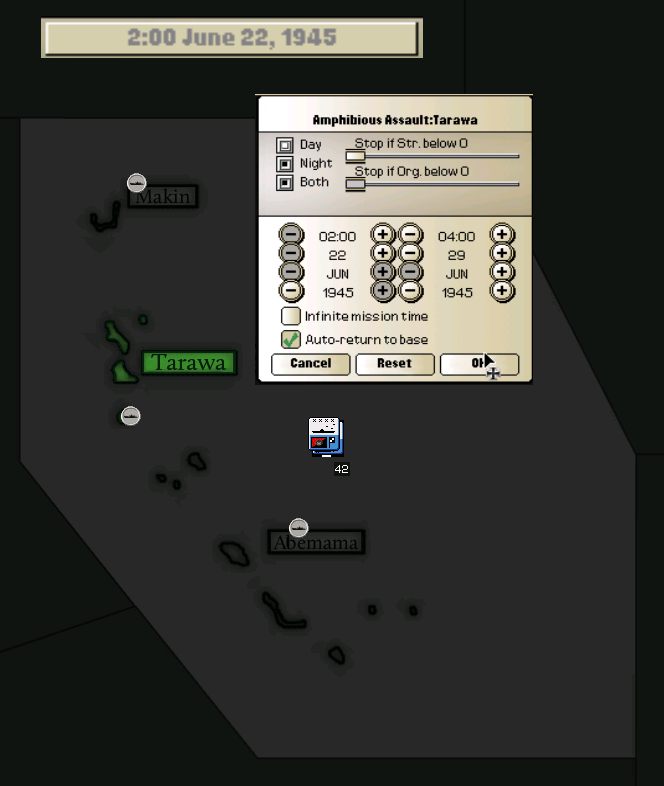 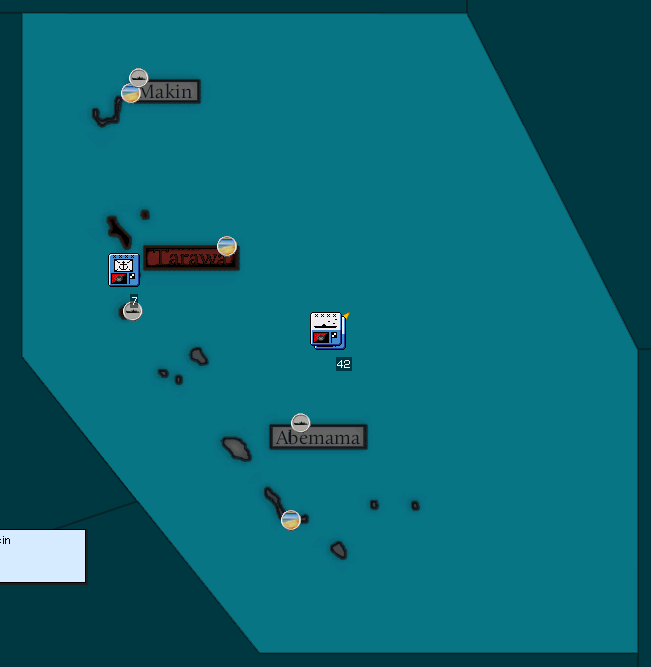 Whether or not to invade and seize the German Pacific colonies to strengthen its own defenses had been a political debate in Australasia when the Prague Pact disintegrated in Europe. The Australasian government, hoping to convince the Germans to combine their refugee fleet with what was left of the Entente navies, had decided not to pursue the plan to forcibly combine German possessions with Entente possessions to form a “Pacific Fortress.” The bloodless seizures of Eniwetok and then Tarawa on the 22nd, seemed to prove the hardliners right. Australasian commanders had put too much faith into Hawai’i following the first American failure to seize it in 1940. After Hawai’i fell, there was nothing to stop the Americans from seizing following staging grounds for further attacks on New Guinea, New Zealand and eventually Australia itself. A concentric series of fortress islands that required bloody assaults to take might have warded off a war weary America. But leaving the islands in the hand of a powerless Germany seemingly guaranteed that American would expand their influence into the South Pacific. 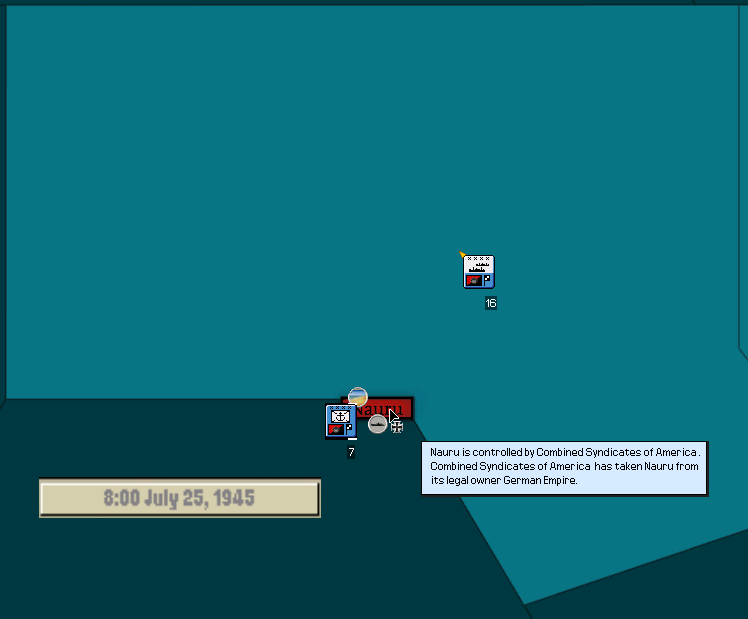 While the Australasians watched helplessly and hoped for the best, the Marines continued their steady march. Nauru was taken a month later on July 25th. In this case, the Marines did encounter some German occupiers. They were surprised to find that the German administrators were desperate to surrender. Germany had annexed the island in 1888 in order to prevent a civil war on the island from affecting their commercial interests. All these decades later, with the local German authority cut off from their fatherland, their grip on the island had loosened and attempts to play off the island’s tribes against each other to maintain control were about to spiral into a renewed conflict. The arrival of the Marines quashed the tensions.  The last of the islands that the Marines would take during the summer of 1945 was Ponape, a mountainous and rainy island in the Caroline chain. The occupation of the more populous island was not so simple as Eniwetok. The Marines found missionaries and colonial functionaries there, and hastily constructed a small detention camp for all Europeans on the island. General Cates would request guidance on what to do with them but received very little. He eventually decided to deport most of the European population. Some integrated just fine into the societies of their newly socialist homelands, while others were faced with a great deal of hostility. One detainee was extradited to Beninkongo and later executed for having killed a local woman during their stint as a soldier in that territory. Some would eventually successfully petition to be allowed to return to the island. The prosecution of the deportation would, in time, garner some controversy, but at the time it went almost entirely unnoticed in comparison with the much larger and more complex problems of post-war reconstruction and reorganization in Europe. With the Americans having almost bloodlessly seized the Central Pacific, the strategic possibilities were manifold. A campaign to take New Guinea was inevitable, as public opinion in both North America and Europe was adamant that the German Empire should be completely extinguished. In addition, Gitlow and his ministers understood the value of New Guinea when it came to exerting influence over the Netherlands East Indies when they inevitably became independent. However, it was not impossible at this point that the Marines would have just one campaign ahead of them to take New Guinea, at which point they would give way to a naval and air campaign that would coerce Australasia to come to the negotiating table. Such an outcome was not outside the realm of possibility given the widespread desire in America to draw down the American military presence overseas.  What nobody knew was that thousands of miles away from the Marines, events in China were conspiring to guarantee that the Marines still had their bloodiest days ahead of them.
|
|
|
|

|
| # ? Apr 19, 2024 22:28 |
|
Lustful Man Hugs posted:By the way, are we seeing the use of Jets/Helicopters in warfare yet? Not as of yet. Helicopters would be the Air Cavalry unit and we have no cavalry so I've never invested in the tree. Jets are on their way soonish, but production priorities in recent years have been focused on the navy and upgrading infantry to motorized units.
|
|
|
|
Chief Savage Man posted:Not as of yet. Interesting - are there any techs that are ahead of OTL?
|
|
|
|
Fluff I don't know but there's a speed penalty to researching a technology ahead of its intended year in Hearts of Iron games.
|
|
|
|
Guess we're knocking down all the empires after all!
|
|
|
|
Lustful Man Hugs posted:Interesting - are there any techs that are ahead of OTL? Not really. America gets a boatload of tech teams but I am pretty evenly spreading them to almost every different category, other than some unit types I'll never use or build any more of (cavalry or battleships, for instance). There's been a lot of catching up on air doctrine and armor tech during this part of the game, as we lagged behind others during the European War because I was trying to get carrier techs up since they're such a huge time investment. csm141 fucked around with this message at 22:33 on Jun 8, 2020 |
|
|
|
Just wanted to remind everybody, given Current Events, that this LP is mirrored at https://timkel.ly/this-land-is-your-land/ and if anything happens to this forum, it will be present there at the very least.
|
|
|
|
For those who have not heard: https://forums.somethingawful.com/showthread.php?threadid=3928980
|
|
|
|
Additionally, I'm looking into identifying some alternate forums to cross post to. I'll keep you all updated.
|
|
|
|
Chapter Ten: All’s Fair (Summer 1945) (Content Warning: description of atrocity) Midday August 21, 2017. Arthur, Nebraska. How often do you get to look around and know for sure that there have never ever been so many people in a place? Like not just in your lifetime, but ever, in all of history. The fairgrounds were full, the lot by the feed stores was full, the streets were lined with cars and now people were just pulling off into random places as the clock ticked down. The county fair brings in a decent crowd, the muster for the Cattlemen’s Strike in ‘72 brought in about a thousand, but the crowd today was at least an order of magnitude larger than that. Arthur had prepared, on and off, for about five years for the total solar eclipse, but nobody had anticipated this many people. Bill Walker had been scrambling all day to make sure everybody was safe and situated. It was not overly hot, but it was still August in Nebraska, on a sunny day. City types from Denver and Rapid City were expecting there to be water fountains and cooling stations. Arthur had two public water fountains, one at the fairgrounds and one at the post office. It seemed like nobody had read the net bulletins about bringing your own water. Luckily, there was a sizable emergency stock… which would now have to be replenished. Some astronomers’ society had sent 500 pairs of solar filter glasses for people who didn’t have any. Those were long gone. On top of all of that, now some of the locals had to be drafted to keep the guests away from the Japanese scientists who needed a zone free of digital interference for their work. This was a historic day that promised to be unforgettable, and Bill couldn’t wait for it to be over. Bill felt a hand grasp his shoulder and turned to find Abdul. “You’re tense, man. Don’t get so worked up that you can’t enjoy yourself.” Bill sighed. “I know… I know. How long we got?” Abdul glanced down at his watch. “Two minutes. Nothing’s going on out there that you’re gonna solve in two minutes.” “Alright.” Abdul was right. It was time to stop worrying. He had done all he could. He put on the filter glasses and craned his neck upwards, ready for the show. ~*~*~ The year nineteen forty-five. An alleyway in Tokyo. “C’mon, Eddie, have I ever steered you wrong?” Leo was going to talk me into this. He always managed to. But I was going to make him earn it. Just to let him know I was getting tired of this poo poo. To let him know he couldn’t rely on me as his assistant forever. I let out a dramatic sigh for effect. “God, kid, you’re like a broad sometimes. Listen… Harry and I got you out of that poo poo hole in Sydney. You’re in Tokyo now! Plenty to eat. No bomber raids. You got a fine girl sitting at home. You oughta have faith in me by now. Things just keep working out for us.” And Leo had a suit that fit, unlike in Australia. Times really had changed these past nine months, that couldn’t be denied. “I don’t know, Leo. This just seems too big for us.” “Don’t you wanna get back to the motherland? Land of the free and the brave? This is our best shot, kid.” “Leo… we have it pretty good here. The promotion is doing killer business. I’m gonna ask Mina to marry me soon. I like being here, man. Can’t that be enough for you?” Leo threw his hands up. “I’m a patriot, kid. I’m not gonna give up on my oath to the forefathers! It’s about more than us! It’s about America, dammit!” I rolled my eyes. Harry, as usual, stood and watched silently. He knew I would cave to the theatric onslaught eventually. But what he did not know was that I was going to make my break from this little operation soon. Mina had family in Osaka and knew some tough guys who she thought might make good wrestlers. I could split and start running my own shows down there and be rid of Harry and Leo for good. But I was not ready to make that move yet, and there wasn’t any harm in going to this meeting. “Eddie, you have to have imagination. Think about it…” “Australasia…” “The Qing…” “The German refugee fleet…” “And Japan holding it all together. We could turn back the tide if we bring these groups together. There’s so much to gain. And nothing to lose.” “There’s always something to lose.” 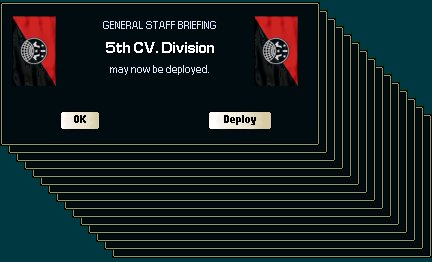 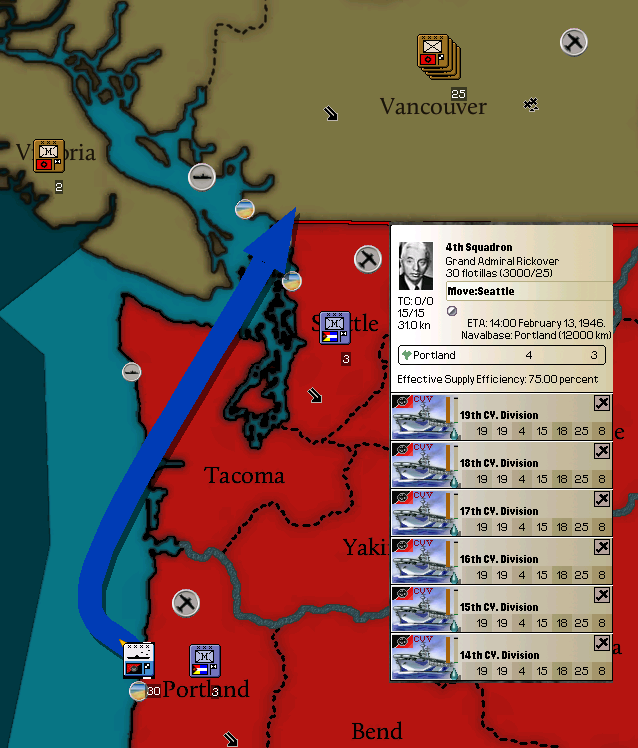 This was insanely high stakes diplomacy. I have no idea how Leo got us into that room. But I knew drat well this wasn’t going to turn out like he planned. Even if he could get all those powers on the same page, how were they going to turn the tide? The Americans were too far out ahead. How were any of these countries going to catch up to America’s naval dominance? Still though, there was no harm in going to the meeting to keep the peace with Leo before I was ready to get out of town. “But, gently caress it. I’m in.” Leo broke into a smile and gave me a hearty clap on the shoulder. “Attaboy!” What was the worst thing that could happen? ~*~*~ Evening August 21, 2017. The Arthur County Fairgrounds. “We’ve had enough problems today, don’t start a brush fire. Tighten that pile up.” Everybody always told Bill that it was impossible for him to truly relax. They were right. Even as everybody around him kept talking about what a wondrous event they’d seen today, Bill needed to manage something. The idea was for the Arthur County community to get together and unwind after a big day. A fire caused by a bonfire collapse wouldn’t be conducive to that end. Most of the eclipse watchers had cleared out by now. Judging by license plates, most were returning to Colorado, but there were a decent amount of South Dakota and a smattering from all over. Even from as far as New Jersey and Quebec. Medic teams had treated a few dozen people for dehydration. Signs posted telling people that they’d have to return to perform public service if they were caught littering seemed to be effective, as only eight citations were issued for littering. Nobody wanted to drive all the way back up here. “Bill, aren’t you tired of bossing people around?” A gray-haired woman drove her electric wheelchair up next to him. It was Moira, who had been the best ranch pilot in Western Nebraska and an accomplished airshow pilot around the whole of North America. At least until the odds caught up with her and a crash down in Amarillo rendered her unable to walk. Then she had become the best curator in Western Nebraska. “I don’t know any other way to be, Moira, you know that.” “For a man who tries his hardest at so many things, you sure don’t try to change.” Bill folded his arms. She had his number on that one. “You hear what Julie found out by Jensen Lake?” Bill turned back to Moira, his eyes wide. “Oh relax, it’s handled. Couple from Tulsa, and they were sitting out there naked as Adam and Eve, playing with each other about 10 minutes before totality. Julie told them to dress up and clear out and they got mad as hell saying that they needed to conceive during totality. Something about energies.” “Good Lord.” “Always something, right? Hey, check it out, they came.” Moira pointed over towards the highway at one of the electric trucks pulling off into the fairgrounds. The door was emblazoned with the logo of the United Ranchers of Western Nebraska, and the back was filled with cameras and wires and other equipment. Bill waved conspicuously in a broad sweep to get their attention even as the light dimmed. “I’m so glad you made it.” The two Japanese scientists, men by the name of Riki and Masato, walked over. “Thank you for the invitation, Mr. Walker.” “Of course, of course. We’ll be cooking up some barbecue, some catfish, Abdul’s rustled up some good moonshine and beer. Help yourself to anything you’d like.” Moira spoke up next. “I hope you got what you were looking for.” “Yes, many excellent photos and good data. Very productive. Thank you for making sure we were undisturbed.” “We’re always happy to do our part for science.” The two men chatted with Bill and Moira a while longer, showed off some beautiful photos of the eclipse, and then wandered off towards the coolers. “They’re very nice. I was worried when we got that email of requirements that they’d be assholes about the whole thing.” Moira remarked, low, so nobody would overhear. “Yeah, I’m pleasantly surprised. You know one of them is part Nebraskan? The shorter one was telling Abdul about it. He said they were offered their choice of going to Oregon, Nebraska or South Carolina and they chose Nebraska because his grandfather is from here.” “Really? Did he say whereabouts?” “Nope. The grandfather disappeared while the grandmother was pregnant, but she always said their grandfather was from Nebraska.” Moira looked back towards one of the men, who was politely enduring having his plate filled up by one of the URWN boys manning the grills. Her brow furrowed. “What is it, Moira?” “Oh, nothing.” ~*~*~ The year nineteen forty-five. Underneath the American Embassy in Tokyo. The bag was whipped off my head and my eyes recoiled at all the new visual stimulus. The single bright light above my head burned itself into my cornea, and as I tried to look at the figures above me, a huge dark spot shifted across my eye to obscure their faces. Where the hell was I? What had happened? The Japanese fellas got very upset with the Chinese ones. Then we stepped out so everybody could cool off. And then there were men on top of us. And now I was here. As the black spots from the bright lights faded, I looked around and saw two men looking at me. There was a white one and a black one. The white fella had a neatly trimmed mustache and was smoking a cigarette. The black fella had a bushy beard and was looking at me with his arms crossed. It took me a moment to realize I was shackled to a chair in a brightly lit room. “Who are you?” The white one pulled the cigarette from his mouth before speaking to me, in a French accent. “We may tell you that, once we figure out who you are.” The black one spoke next, in an American accent. Northeastern perhaps. Baltimore? “You weren’t supposed to be in that alley tonight. We didn’t plan for you. And you being in the wrong place puts both you and us in a complicated spot. So, let’s start with your name.” 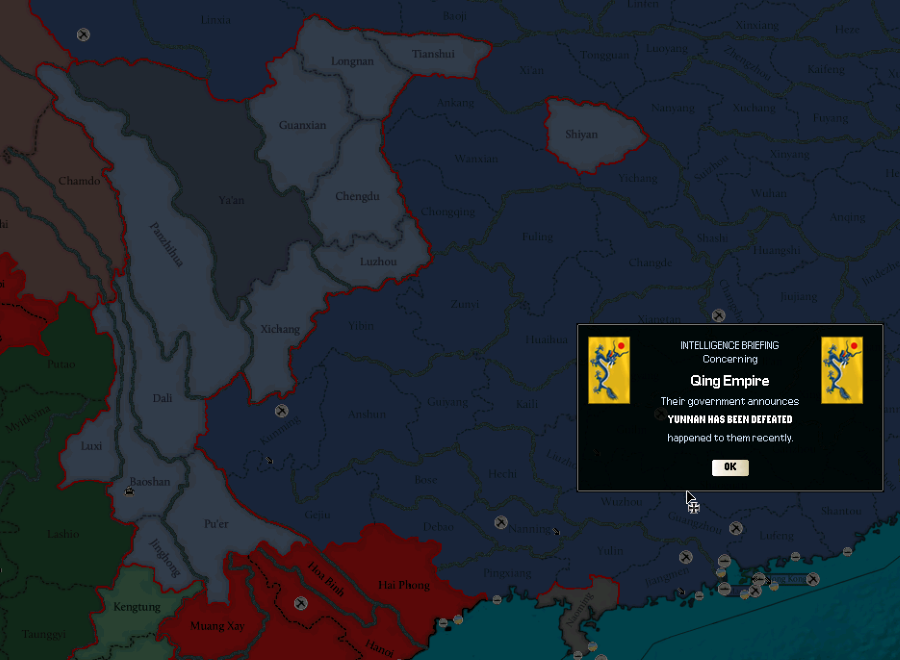 My head was swimming as I tried to process what they were saying to me while also trying to piece together what had happened. The meeting had broken off after the Chinese and Japanese delegations got into an argument over the former’s expansionism. Leo had gotten upset and Harry told him to go out to the alley to cool off. Then I tried to go after him, but Harry held me back. But when Harry looked away, I decided to go anyway… Harry only wanted Leo out there… “Harry.” “Harry what?” “Oh uh… no. My name is Eddie. Eddie Roberts.” “Alrighty then. Where you from, Eddie?” My brain had to strain for this one too. Had they hit me on the head or something? I worked backwards through flashes of memories: The peace of Tokyo, the horror of Sydney, the tension of Vancouver, the distant unreality of Lincoln. So long ago that felt. “Lincoln. Lincoln, Nebraska.” The Frenchman perked up. “Isn’t that close to where you’re from, Albert.” “I’m from Maryland.” “Which is near Nebraska… right?” The American ignored his partner and looked back towards me. “How’d you end up here?” “Well, my dad ran from the Reds… wait, you guys are Reds, right?” No answer. “Um, well okay. We ran from the Reds and went to Vancouver. Then we ran again to Sydney. And then Leo- wait, where’s Leo?” No answer.  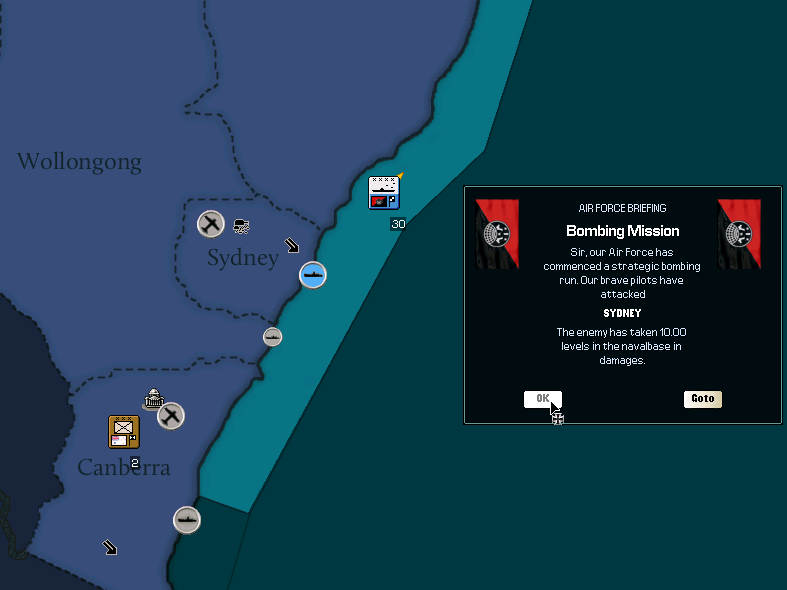 “Well, Leo left Sydney to come to Tokyo, and I went with him, to get away from the bombings and rationing.” “How well do you know your friend Leo?” “Well, I just know him from the club he and my dad were in in Sydney. For American expats, you know? He’s a clown. But he had a ticket out, so I went with him.” The American, who had been called Albert, continued to stare at me with an intense evaluating stare. “Do you think he knows?” the French one said. “I don’t think so. Should we show him?” “Your call.” Albert pulled a leaf of paper from the folio on the table in front of Eddie and then placed it down so I could read it. Leo’s picture was on it. LEONARD GRAVES WANTED FOR SIX MURDERS COMMITTED NEAR BAKERSFIELD, CALIFORNIA IN JULY 1940 The American tossed a photograph on the table. It was impossible not to immediately look at the grotesque sight of six corpses arrayed on the ground like game animals after a bountiful hunt. Behind the horrifically magnetic display stood a man smiling, the successful hunter. It was Leo. I wanted to vomit. The American had taken the first document back without me noticing. He began to read from it. “After Red Army forces had seized control of Bakersfield, local farm laborers requested their assistance in searching for evidence regarding the fate of six missing men. A thorough search of the farm where they worked revealed an office of one Leonard Graves, in which was found the attached photograph. Further investigation uncovered a grave where the six missing men were discovered. All six men appear to have been executed by gunshot to the head and then their bodies burnt. Residents confirmed that the six missing men had been involved in attempting to unionize the farm laborers and that Graves fled the area ahead of the Red Army advance. In March 1942, Graves was convicted in absentia of six counts of murder in the first degree, along with several lesser charges.” The American flipped it over. SENTENCE: DEATH ~*~*~ Morning August 22, 2017. Thorne Avenue, Arthur, Nebraska. Riki’s head was pounding. They had kept giving him moonshine and it felt rude to say no. He should have. And then he wakes up to this mysterious message pinned to the door. Please see me at the old courthouse museum before you leave town. We may have answers for each other. -Moira What on earth could this be about? He took in the sand hills surrounding the town, now devoid of eclipse watchers. Then he walked down the main road in this little town, towards what could be called a town center, if you were being charitable. Some eclipse watchers had stayed the night and were now packing up to return home. A handful of locals were getting ready for the day, packing things into trucks, taking down temporary barricades that had been erected for Eclipse Day. They all waved and said hello. This state his grandfather had come from was a friendly place. The old courthouse museum wasn’t hard to find. It was the small white structure. Not the old church, which was made of plastered over hay bales, but the little clapboard building in the park. The one behind the more modern building that was the hall of its primary syndicate, the United Ranchers of Western Nebraska, whose logo of three figures on horseback driving a herd adorned nearly every home and vehicle in the town. Riki stepped up to it and found the door was ajar. He slowly pushed it open, causing a bell to ring. The old woman, Moira, looked over her shoulder. “Ah hello, I’m so glad you came. I apologize for the strange way I asked you to come here, but I thought it’d be better if this was done in person rather than through email. And I didn’t want to miss you in case you decided to pack up and leave first thing.” Riki looked around. There wasn’t much to the museum. ORIGINS REVOLUTION INTEGRATION CATTLEMEN’S STRIKE 2017 ECLIPSE The last entry was written in chalk, and Moira had taped different photos to the wall underneath it. She had gotten right to work memorializing the eclipse. “First things first. Would you mind sending copies of your photos from yesterday to me? We would love to hang them in the museum.” Riki nodded. “Certainly.” “That’s not why I asked you here, don’t worry. I could have emailed you for that.” She taped the remaining photos in her hand to the wall and then wheeled herself over to her desk. “Please, come over here.” Riki walked over to the cluttered desk. Moira picked up a few items and moved them over to try to make room for him to see the computer monitor, an old CRT behemoth. Riki figured he should help and picked up a large frame. He looked down at it. It was an old brochure. quote:MAY DAY 1957 The brochure featured the red and black jets of the Devils in a delta formation flying over the heads of Duclair, Stewart and some other men in bomber jackets and flight goggles, all looking rather dashing and brave. There were autographs over top of Duclair and Stewart. “I’ll take that.” Riki handed it over. “This is very precious to me. Ella and Adrienne were why I wanted to fly. There were my heroes as a little girl. I’ll never forget when I got to meet them. Mr. Thorne drove me all the way to Omaha himself to make sure I could see them myself instead of just on television. Which… back to the subject at hand.” She placed the brochure on a shelf behind her, and then pulled up a webpage on the computer screen. DATAVERSE it said at the top of the page. She clicked on Bookmarks, then pulled up another page before pointing to a specific line. Riki pulled out his reading glasses, then his mouth fell agape. EDWARD “EDDIE” ROBERTS “Is that your grandfather’s name?” “Y-yes.” “I’m sorry for digging into this without asking if it was okay, but I also needed to know. When I heard you had a missing grandfather, and I saw your face. You have his nose. And chin. Your grandfather didn’t just disappear. He was kidnapped by exile hunters and relocated here.” ~*~*~ The year nineteen forty-five. Underneath the American Embassy in Tokyo. “What do they tell you about us? In Sydney?” Eddie could barely think. Could this be true? It had to be. There was a picture. “I uh… what do you mean?” “What kind of people do you think we Reds are? What do they tell you about us?” “That you’re brutal. Evil killers. You want to destroy everything and burn down churches and rape nuns. You’re coming to Australia to slaughter all the white men. Or something like that.” “Do you believe that?” “I don’t know. Not really? I think you do bad things but they exaggerate to scare people.” “Well, Eddie, you should know this. We do do bad things. We can be brutal and terrible. But it doesn’t come from nowhere. When our people peacefully organized to ask for what they were owed…” He tapped his finger on the photo. “This is what was done for them. So, we are far past the point of having qualms about what we need to do to them. We are going to carry out the sentence laid upon your friend. That is what we came here to do.” I stared right into his eyes. He wasn’t lying. This was a man who knew what he believed and had killed for it already and would do so again. “Still. We don’t kill for fun. We take out those who deserve it. As far as I can tell, you’ve done nothing to nobody. So, we’re going to try to figure out a way out of this for you. Provided you cooperate with us.” I stared at the photo one more time. These Reds… they couldn’t be worse than that. “Whatever you want.” ~*~*~ Morning August 22, 2017. The Arthur County Museum in the Old Courthouse. quote:TO BE DECLASSIFIED UPON SUBJECTS DEATH Riki’s hangover was gone, but his head was still swimming. It was all there. The answers that had eluded his mother her entire life. How was he going to break this news to her? “How did nobody know about this before now? Did you not know where he came from?” Moira wiped a tear from her eye, which made Riki realize that he was also welling up. “No. It’s hard for young people to understand, and also for folks from Japan I suppose, since you didn’t have the civil war like we did. But that was how things were back then. After the revolution and the wars, people would just appear out of nowhere. Without a history. And if they were willing to work and do right by the community, then nobody asked questions. Because we knew that it would bring up old scars to do so. Marshall declared an amnesty in ‘37, and we had hard times between recovering from the civil war and the wars after that. We couldn’t afford to question anybody who was willing to work. And your grandfather… Mr. Thorne. He worked hard for us in Arthur.” Moira gestured to the wall of exhibits. Indeed, Edward Thorne, previously Edward Roberts, was all over them. There was a photo of him on a horse in the Cattlemen’s Strike exhibit. There was a photo of him posing with the logo of the then new URWN. “He was the man who got the white folks over their objections to merging with the black syndicate out in New Audacious. He reached out and made amends with the tribes. Without him, I don’t know if there would be a URWN. Without a URWN, no Cattlemen’s Strike. He was like another father to the kids in the county too. Just so important. So no, we felt like we would be insulting him to question where he came from. He just appeared one day in 46 and got to work. We assumed he was probably the son of a federal sympathizer who didn’t want his history to be known. We never imagined he had come from Operation Longarm.” “What’s Operation Longarm?” “Oh, it was a bit of a scandal when people found out about it. It was a project by the Bureau of Security: death squads, essentially. They went into other countries to carry out sentences against people who had committed atrocities during the Civil War and before. Like this Graves guy, he murdered six organizers in California then went into exile in Australia then Japan. So, they tracked him down and killed him. But in the process of doing this, there’d be innocents who got caught up. Wives and children mostly. So, they would resettle those people back here, under surveillance. That’s where Mr. Thorne came from.” ~*~*~ The year nineteen forty-five. Underneath the American Embassy in Tokyo. “We need to know what they were talking about in that meeting, Eddie.”  “Okay, sure. Leo was trying to get everybody on board in some kind of alliance. But the Japanese representatives were skittish. Said that the Americans are too powerful. That they have fantastic weapons none of the four countries could even dream of having.” 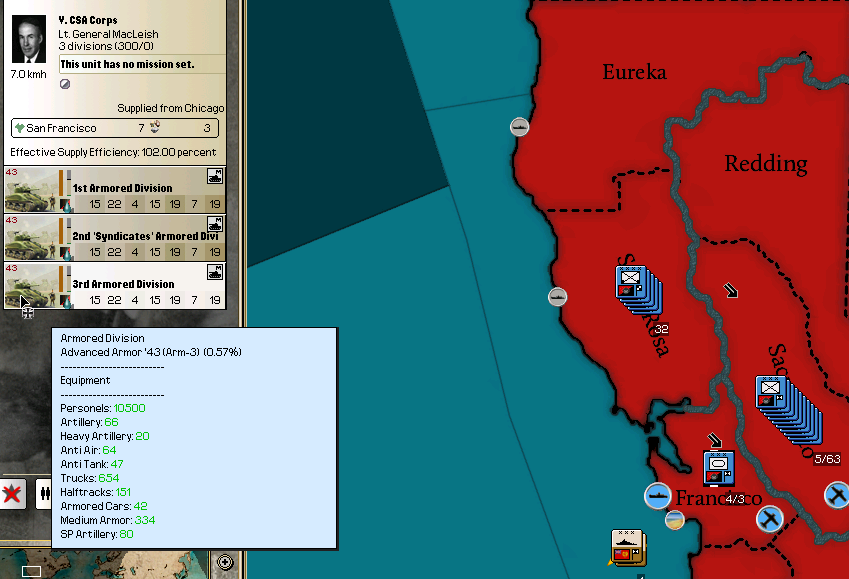 “But the Australasians still wanted help. Said that Red tanks rolling across Australia wouldn’t make any of them safer.” 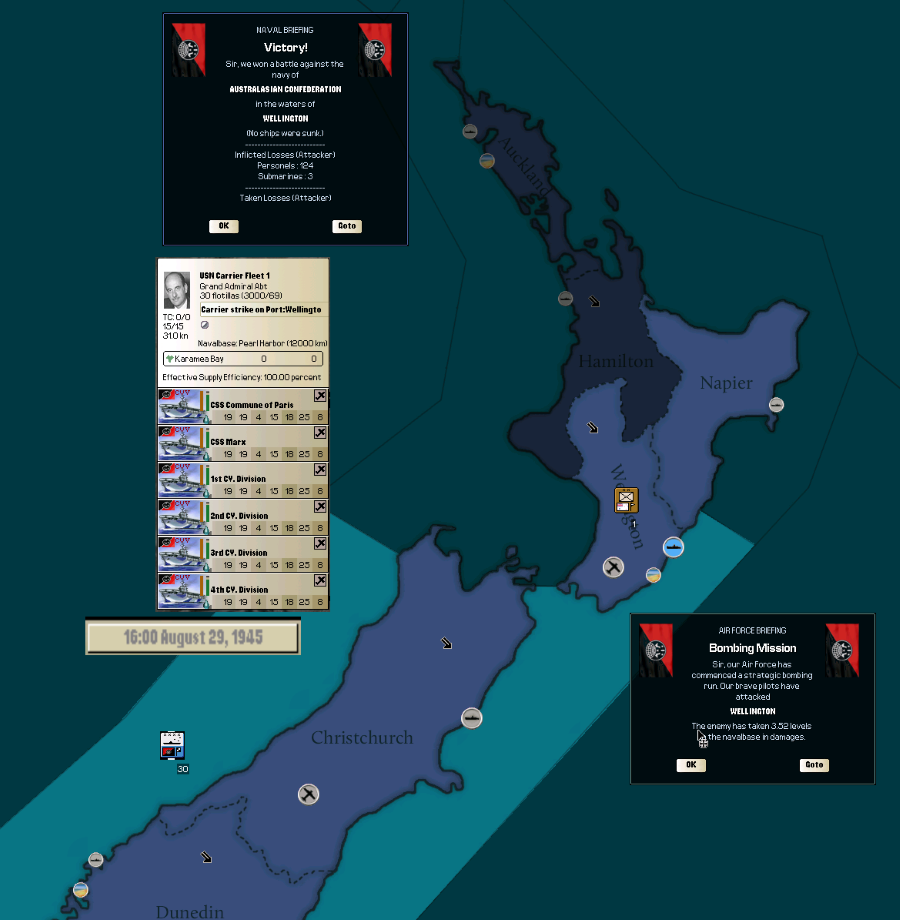 Pierre was facing away from Eddie, his hands clasped behind the small of his back. He spoke up. “Indeed. The others are in a tough position. They don’t want us in the Pacific, but they can’t confront us directly without being destroyed.” “Well, yeah. That’s why the Japanese proposed another solution.” Pierre spun around. “If you tell us what that is, and you are truthful, we can help you.” “They suggested that Australasia should let New Zealand go. Grant them independence under Japanese protection, and that that would give the Americans pause.” Albert now stroked his beard. “Crafty. Gotta give them credit for that one.” 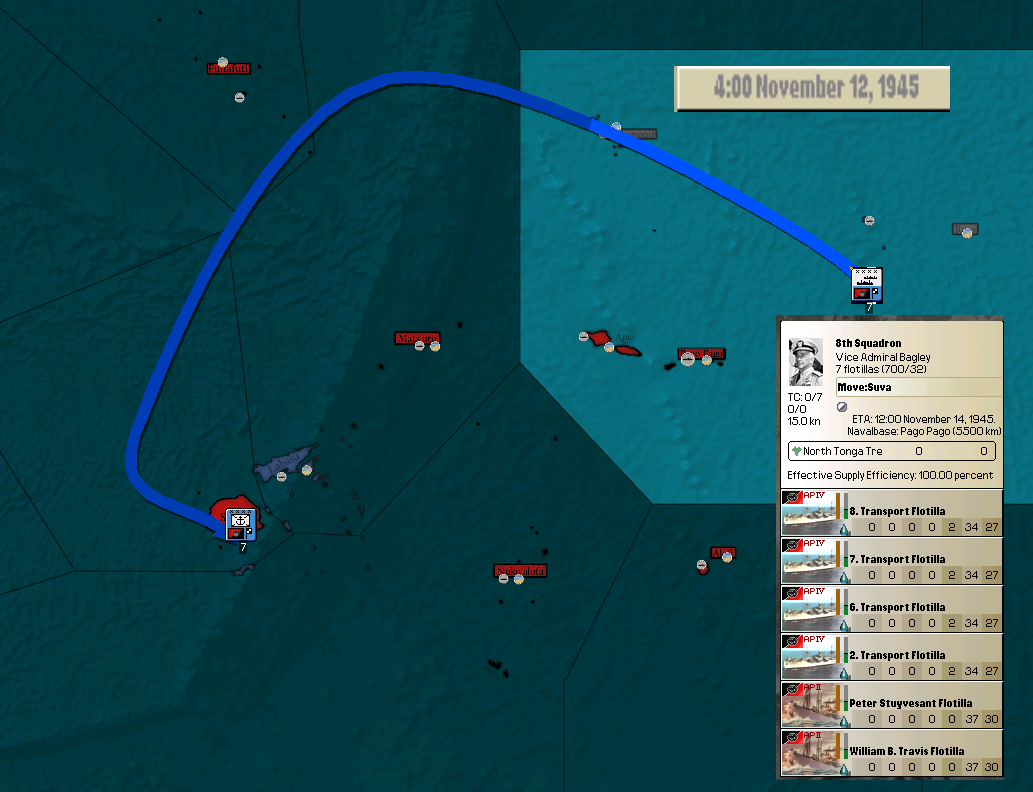 “How was the proposal received?” “The Australasians balked at it at first, but the Germans said that they now wished they had given up their outer islands to Japan, and that if they had accepted the offer before Fiji had been taken, they’d all be better off. And then one of the Australasians said that if Germany had helped during the North American war, they’d also be better off. That’s when they started bickering with each other, and then we all went out for a break, to try to get people to cool off. And that’s when Harry sent Leo out to the alley and I went after him. Harry’s one of yours, isn’t he?” “No. You don’t get to ask questions yet, but I’ll give you that one because I’m nice. He’s not one of ours. Anyway, this is good information, if it holds up to verification. We can probably get you to America in one piece with this.” Eddie sat up. “You mean I can’t stay here?” “No. You know too much about us. We have programs for people who get swept up in this sort of thing. It happens pretty frequently. You would be monitored, to make sure you’re not in contact with foreign agents, but you would be able to live out your life. New name, new job, new opportunities.” “What if I refuse?” “We lock you up for being associated with an enemy of the revolution. Five years or so. You can come with us in chains or with a train ticket to your new home in hand. Your choice.” “I’m getting married. Can… can I bring her with me? She’s pregnant.” Albert let out a sigh. “Maybe in a few years if you’ve shown you’re trustworthy you could be allowed to contact her and see if she wants to move to wherever you end up. But you can’t contact her now. Nobody can know we have you. And frankly, I’m not interested in kidnapping a random woman off the street so she can go with you.” “So, I can’t even say goodbye?” “No.” “I know it’s unfair, but it’s war. Sometimes there’s collateral damage. You should have listened to Harry and stayed inside.” Pierre said, more softly than before. His face was sympathetic but there was no doubt in his eyes. There was no way out of this for me. “You were in the wrong place at the wrong time. I’m sorry.” ~*~*~ A ridge to the north of Arthur. Midday of August 22, 2017. Riki had sent a message to Masato explaining what was going on. He had come running to be there for him. Moira had also told Bill. At Riki’s request, nobody else in town yet knew. It was just the four of them out here. And Ed. It was quiet up here. Just the rustle of tall grass in the wind, occasionally punctuated by the rumble of a distant truck, or the buzz of a ranch helicopter seeking out a wayward bull. Bill broke the quiet. “We buried him here because it was his favorite place to be. He would ride up here early in the morning and watch the town wake up. I can’t claim to know why he never contacted your grandmother. I know he hated to disappoint people. Maybe he was too ashamed to talk to her again after disappearing for so long. But he would have loved you. He was always keeping up on science and things like that.” He stuck his hand out for Riki to take, which he did. “He was the father of the United Ranchers and we are all children of the syndicate. So, I figure that makes us cousins. You are part of the URWN family.” When their hands came apart, Riki found a lapel pin with the URWN union bug embossed with HONORARY. Riki knew enough about American syndicate culture to understand that this was a great honor. His eyes welled up with tears again. What a twenty-four hours! He had come here for an eclipse and left with a new family. “Thank you, Mr. Walker. I suppose I was in the right place at the right time, huh?”
|
|
|
|
few items: - I don't think this is the thing I've written that most needed a CW by any means but when I was reading it I knew that other creators I trust probably would have included one. so I've decided I'm gonna include some when I think I need them and put them behind a spoiler in case others don't want to know anything about what's in the update. - With regards to migrating the LP, if the prophesied transfer from Lowtax to whats his face does eventually happen then I'll stay right here because fragmentation is something I'd like to avoid. We'll see what happens but for now, I'll keep posting here.
|
|
|
|
I love this LP so much.
|
|
|
|
Hot drat, it's back!
|
|
|
|
Once again I find myself impressed with the sheer consistency of quality throughout this LP, it's really something special to behold
|
|
|
|
Chapter Eleven: Operation Kangaroo (December 21, 1945 – February 1, 1946) CENTCOM CHICAGO “Do we really want to shift our entire axis of attack based off something a random exile kid said during interrogation?” “The intelligence has been corroborated by other sources.” “We could be being led down the path they want us to go down.” “They want us to invade their core territory?” “If they’ve turned the islands into a redou-“ “There’s no evidence of that!” Chairman Ben pushed himself up from his chair and walked right out of the room, silencing the bickering committee. There was no chance of consensus here. He had a better chance of getting everybody on board by talking to people one on one and convening again later, after he had already figured out which option would win out. This sort of situation? It only hardened people’s resolve and led to factionalism on a given issue. People were no longer advocating for New Guinea first or New Zealand first on the merits, they were advocating for it because they did not want to admit defeat in this conversation turned conflict. George left the room next. He knew exactly what was happening, as did the other long timers in the room. Keller, Olson, and Tresca all knew the score. George went directly to Ben’s office. “Chairman.” “George. They can be such putzes sometimes.” George remained silent. He didn’t often speak ill of the others. “Anyway. Tell it to me straight, George. What’s the right play here in your view?” “I think this scenario posited by our sources in Tokyo is pretty messy. But we do not need New Zealand to get at Australia. New Guinea south to the Gold Coast is plenty viable.” “I’m concerned about the domestic blowback to letting part of an enemy state go under somebody else’s influence. You know what I’ve always said.” “Once we’ve got it, we can’t let it go. I know. However, it is not my place to advise you on matters of public opinion.” “But you have an opinion anyway, George. Give it to me.” “I think people are plenty tired of fighting, Chairman. I don’t know if the absence of a red flag over Auckland will be what breaks their spirit.” Ben grunted. “I still don’t like the idea of allowing Japan into the South Pacific like this. Striking fast has been good for us before. Establish ourselves before anybody has an opportunity to do anything about it. Tell me about this… Operation Kangaroo. Are there kangaroos in New Zealand?” “Maybe in a zoo. That’s one of my staffers attempts at misdirection.” “Ah. You’ll think the Aussies’ll go for it?” George’s eyebrows raised. “Honestly? Maybe.” ~*~*~ TOP SECRET OPERATION KANGAROO THE KANGAROO PLAN CONSISTS OF TWO SUB OPERATIONS.  THE GREAT FLEET, UNDER ADMIRAL EISERT, WILL BE REQUIRED TO BOMBARD INVASION AREAS AND THEN SHOULD REMAIN IN THEATER AS LONG AS NECESSARY. THREAT TO NAVAL ASSETS IS DEEMED MINIMAL. 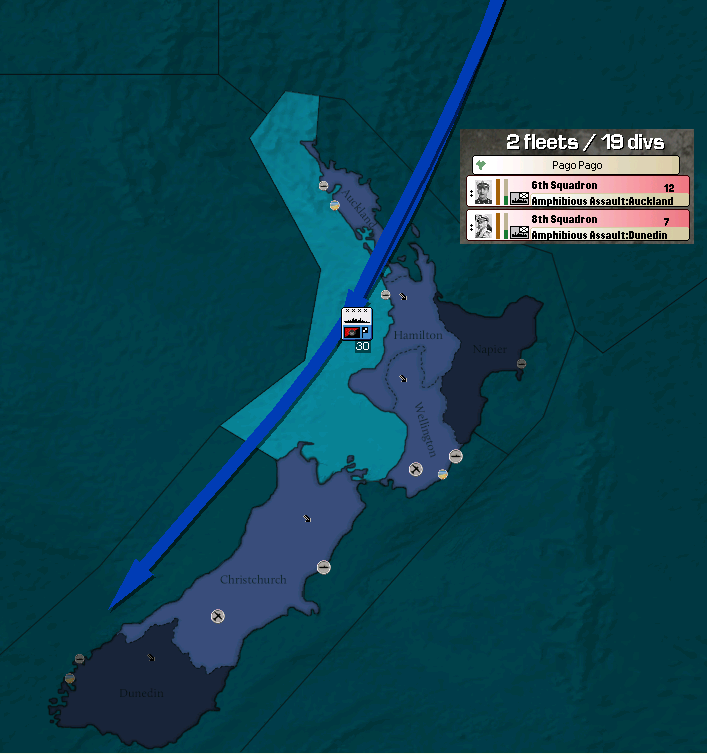 THE TWO SUB OPERATIONS OF KANGAROO ARE OPERATION POUCH, AGAINST THE NORTH ISLAND, AND OPERATION HOP, AGAINST THE SOUTH ISLAND. 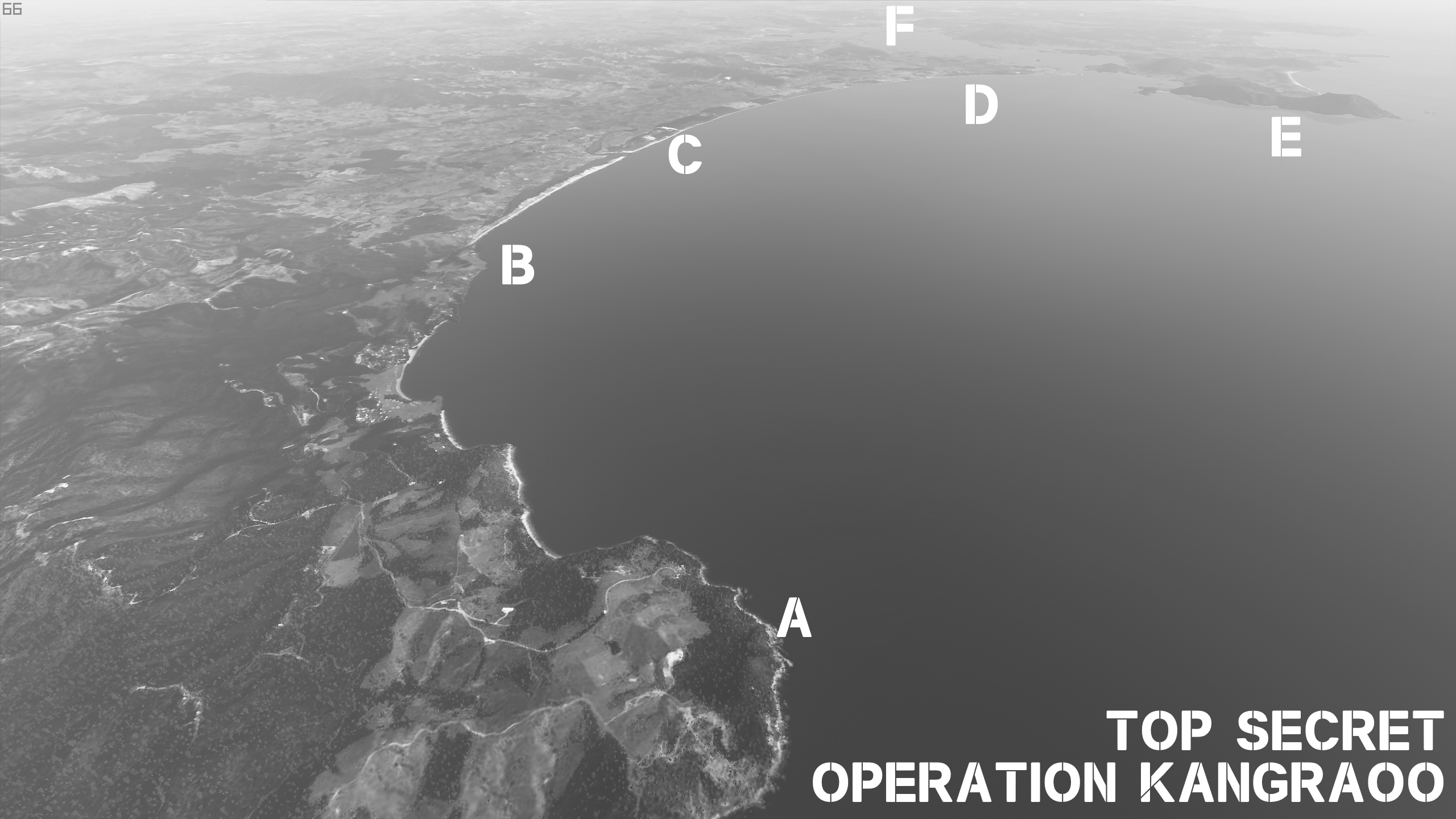 OPERATION POUCH: AFTER COMMANDO UNITS SEIZE THE HEN AND CHICKEN ISLANDS 15 MILES OFFSHORE, ADVANCE ELEMENTS OF THE FIRST REVOLUTIONARY MARINES WILL ASSAULT THE AREA SURROUNDING BREAM BAY. POINT A, MANGAWHAI CLIFFS, IS A POTENTIALLY FORTIFIED ZONE THAT SHOULD BE REDUCED VIA BOMBARDMENT. POINT B, THE ZONE SOUTH OF WAIPU RIVER MOUTH, IS A SAND SPIT WITH A SMALL BAY BEHIND IT. THUS IT IS NOT AN IDEAL LANDING AREA. POINT C, URETITI BEACH, IS A PROMISING LANDING ZONE. IT APPEARS FLAT AND IS ONLY HALF A MILE FROM THE MAJOR ROAD CONNECTING WHANGAREI AND AUCKLAND. POINT D, MARSDEN POINT, CONTAINS A NEWLY BUILT PORT FACILITY THAT SHOULD BE CONSIDERED A HIGH PRIORITY TARGET. POINT E, BREAM HEAD, OVERLOOKS THE ENTIRE BAY, AND MUST BE SEIZED FIRST. POINT F, WHANGAREI, IS THE ULTIMATE OBJECTIVE OF OPERATION POUCH. 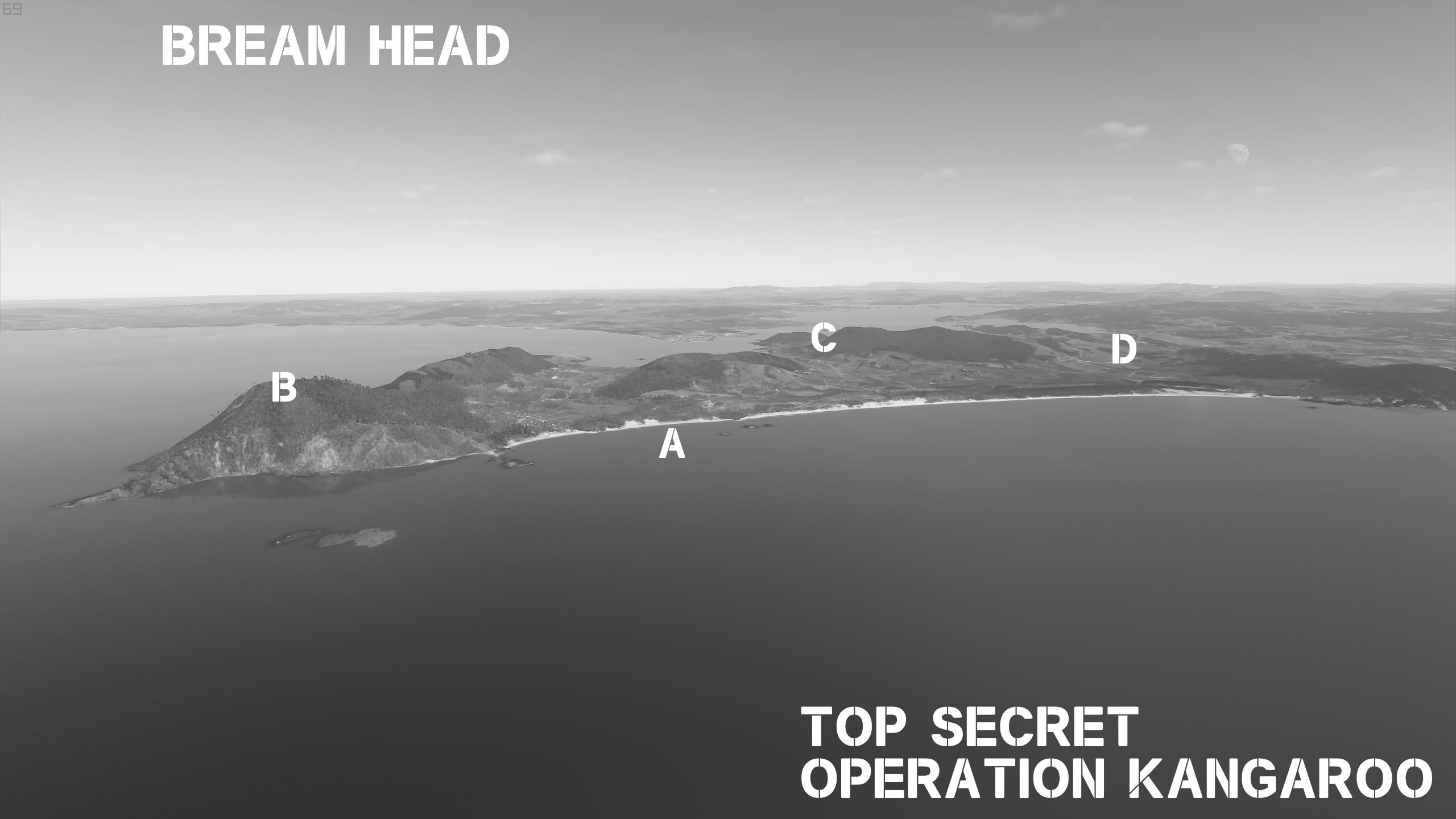 THE FIRST OBJECTIVE OF OPERATION POUCH IS THE SEIZURE OF BREAM HEAD, A PROMONTORY THAT OVERLOOKS THE ENTIRETY OF BREAM BAY. ITS CAPTURE WILL SECURE THE REST OF THE OPERATION. POINT A IS THE BEACH THAT SHOULD BE ATTACKED FIRST. POINT B IS THE LIKELY LOCATION OF A RADAR INSTALLATION THAT SHOULD BE DESTROYED VIA BOMBARDMENT AND THEN FORTIFIED WITH ARTILLERY FOLLOWING CAPTURE. POINT C (OPPOSITE SIDE OF HILL) IS A CIVILIAN SETTLEMENT THAT SHOULD BE AVOIDED, UNLESS GARRISONED BY ENEMY FORCES. FOLLOWING THE SECURING OF POINT B, FORCES SHOULD ADVANCE TOWARDS WHANGAREI VIA THE ROAD AT POINT D. 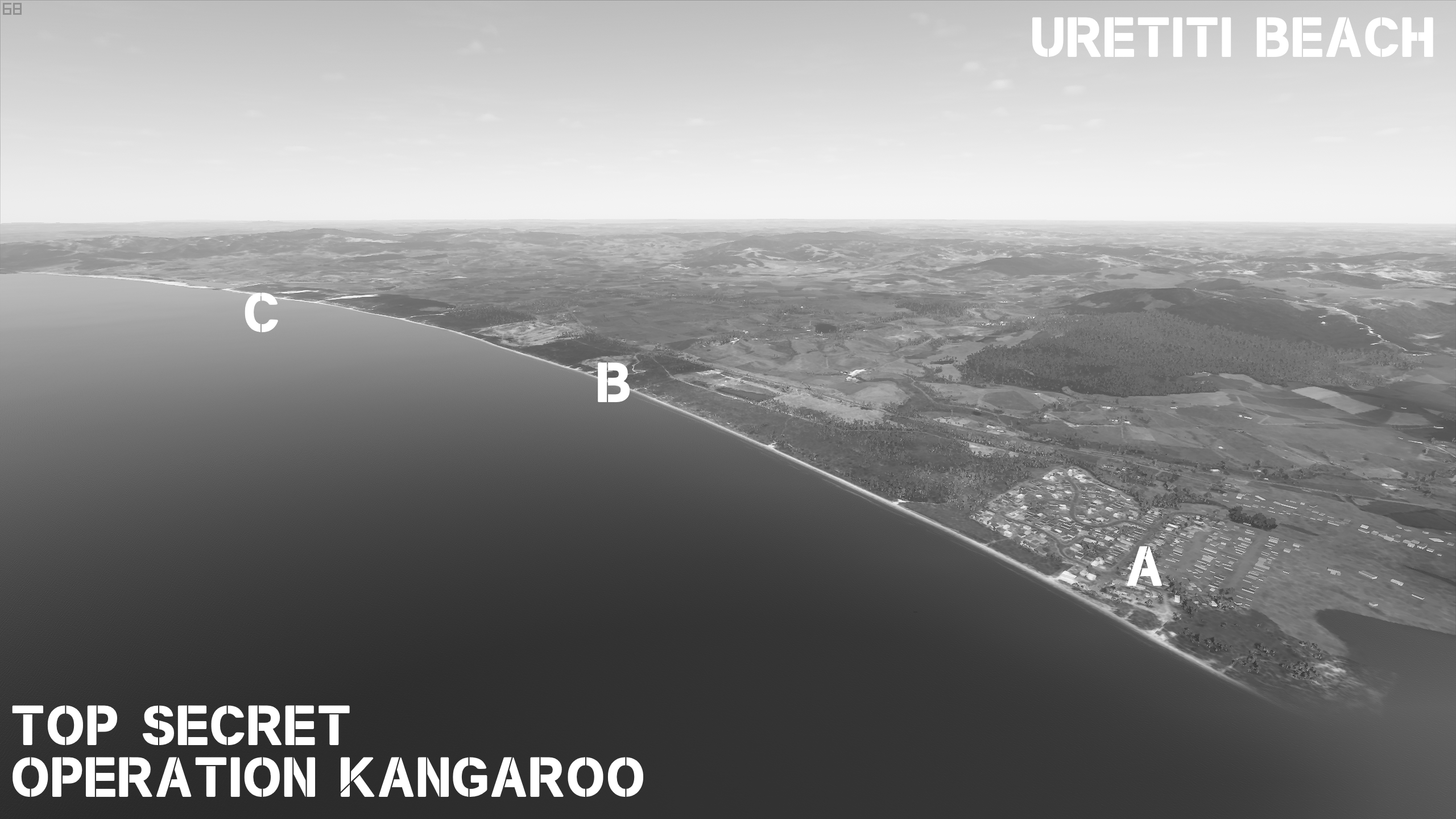 THE PRIMARY LANDING ZONE ENCOMPASSES THE VILLAGE OF RUAKUKA (POINT A). INTELLIGENCE IS STILL WORKING TO VERIFY REPORTS THAT THIS VILLAGE HAS BEEN DEPOPULATED AND REPURPOSED AS A BARRACKS TOWN. IF VERIFICATION CAN BE SECURED, THIS POPULATED AREA WILL BE A FREE FIRE ZONE. POINT B, URETITI BEACH, IS BACKSTOPPED BY LOW LYING FOLIAGE. THIS AREA SHOULD BE BOMBARDED TO REDUCE HIDDEN MINES AND BOOBY TRAPS. POINT C IS THE SOUTHERN MOST BOUNDARY OF THE LANDING ZONE.  POINT A, A NEWLY CONSTRUCTED PORT FACILITY AT MARSDEN POINT, MUST BE SEIZED AS INTACT AS POSSIBLE. IT IS CRITICAL INFRASTRUCTURE THAT IS THE VERY FIRST PRIORITY OF THE OPERATION BEHIND THE SEIZURE OF BREAM HEAD. POINT B IS THE VILLAGE OF ONE TREE POINT. THIS IS A CIVILIAN TOWN AND SHOULD BE AVOIDED, UNLESS GARRISONED BY ENEMY FORCES. POINT C IS A HILL THAT OVERSEES THE CRITICAL OPERATION AREA AROUND MARSDEN POINT. IT SHOULD BE REDUCED VIA BOMBARDMENT. POINT D, MARSDEN BEACH, SHOULD BE THE FIRST POINT OF ATTACK, EVEN THOUGH URETITI BEACH IS A SOMEWHAT MORE SUITABLE LOCATION FOR THE BULK OF FORCES TO LAND. POINT E, RUAKAKA RACECOURSE, IS A SUITABLE LOCATION FOR A COMMAND CENTER. 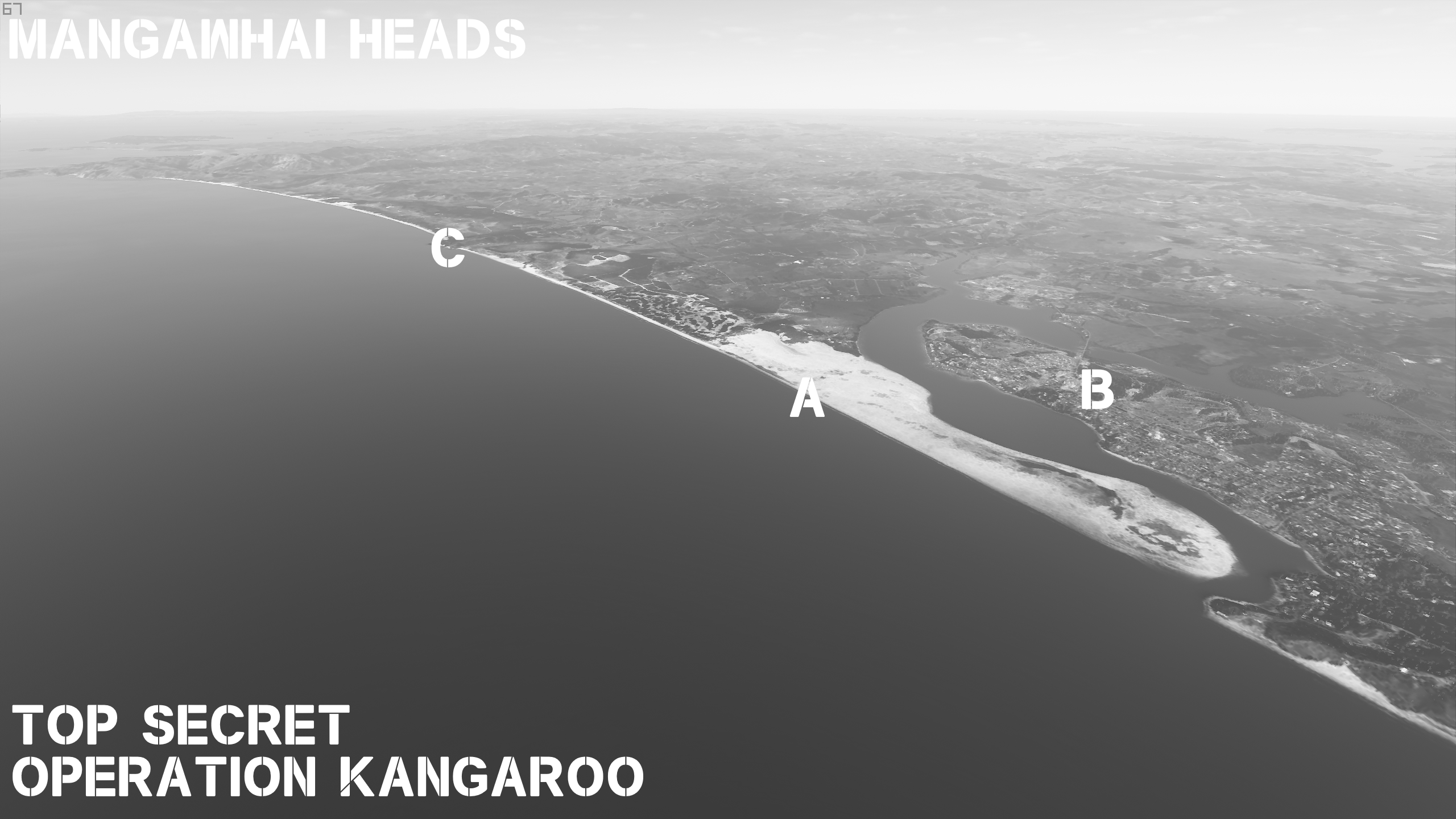 IF THE BEACHES ARE UNSUITABLE FOR LANDING VEHICLES, AN ALTERNATE SITE (POINT A) HAS BEEN LOCATED ON THE SOUTHERN SIDE OF MANGAWHAI CLIFFS. POINT B, THE VILLAGE OF MANGAWHAI HEADS, IS A CIVILIAN SETTLEMENT AND SHOULD BE AVOIDED, UNLESS GARRISONED BY ENEMY FORCES. POINT C, TE ARAI POINT, OVERLOOKS THE BEACHES AND SHOULD BE BOMBARDED IN CASE OF HIDDEN FORTIFICATION IF THIS SECONDARY BEACH IS REQUIRED. 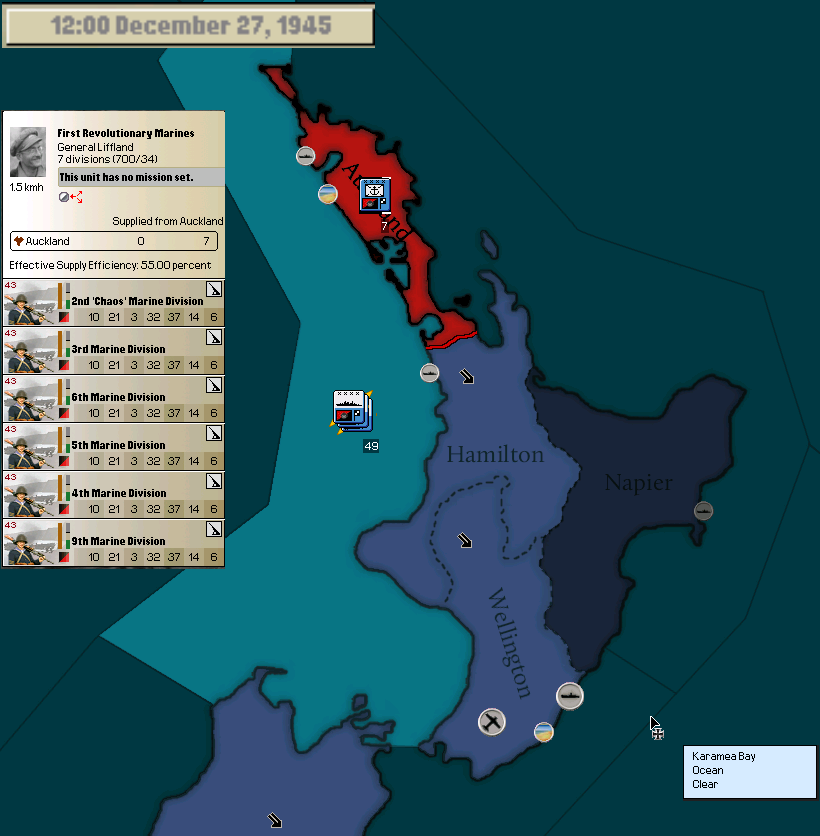 FOLLOWING THE CAPTURE OF WHANGAREI, FORCES SHOULD ADVANCE UPON AUCKLAND AS QUICKLY AS PRUDENCE ALLOWS. OPERATION HOP: 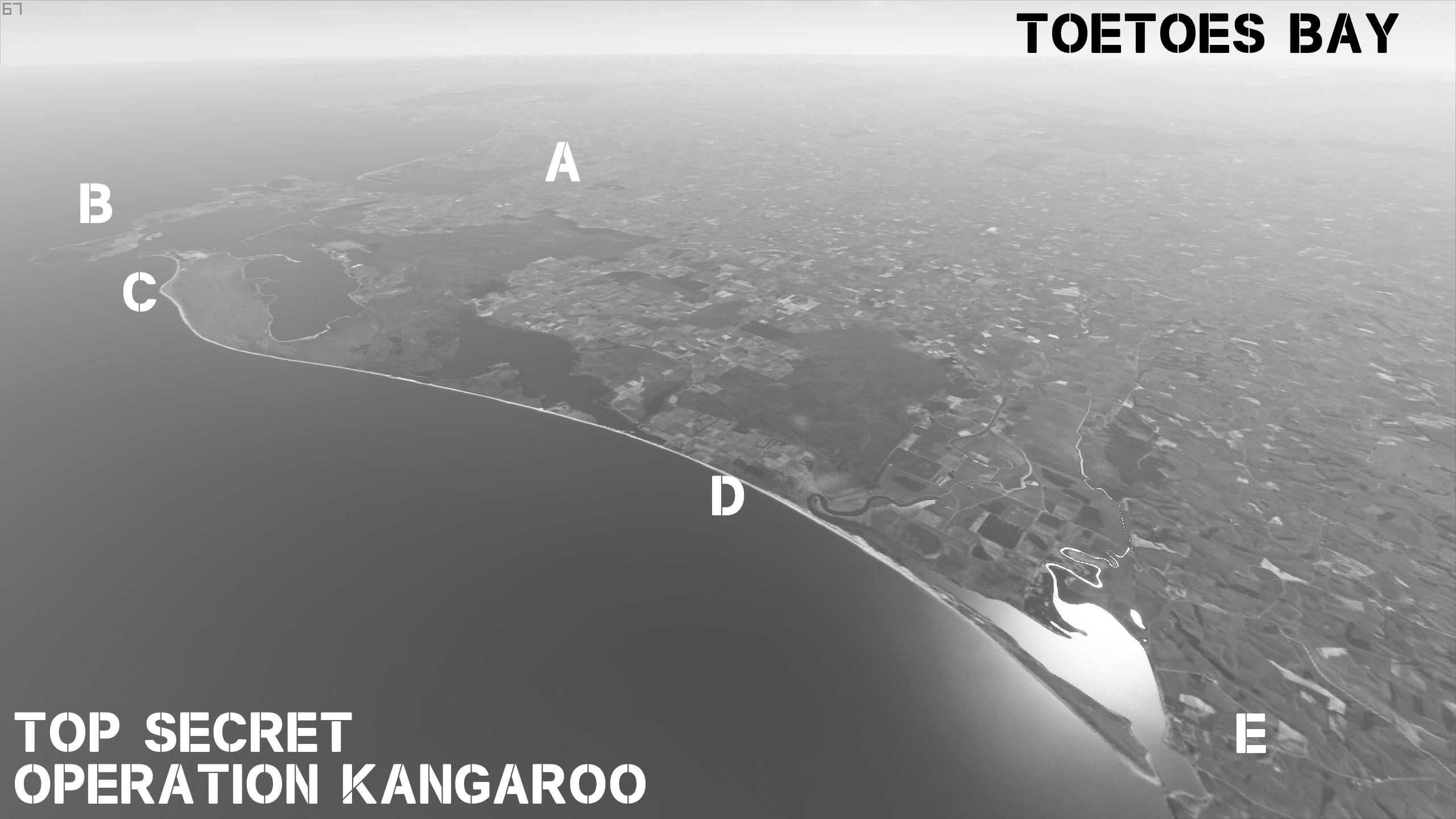 THE GOAL OF OPERATION HOP IS THE CAPTURE OF BLUFF (POINT B) AND INVERCARGILL (POINT A) WHICH WILL ALLOW OUR MOBILE FORCES ACCESS TO THE SOUTHLAND PLAINS. POINT C AND POINT D ARE THE PRIMARY LANDING ZONES. POINT E IS A CIVILIAN SETTLEMENT THAT SHOULD BE AVOIDED. DUE TO THE IMPORTANCE OF THEIR CAPTURE, BLUFF AND INVERCARGILL ARE CONSIDERED FREE FIRE ZONES, THOUGH COMMANDERS SHOULD NOT SHOW RECKLESS DISREGARD FOR CIVILIAN LIFE.  RUAPUKE ISLAND IS TEN MILES SOUTH OF POINT C. IT IS NOT BELIEVED TO BE FORTIFIED. 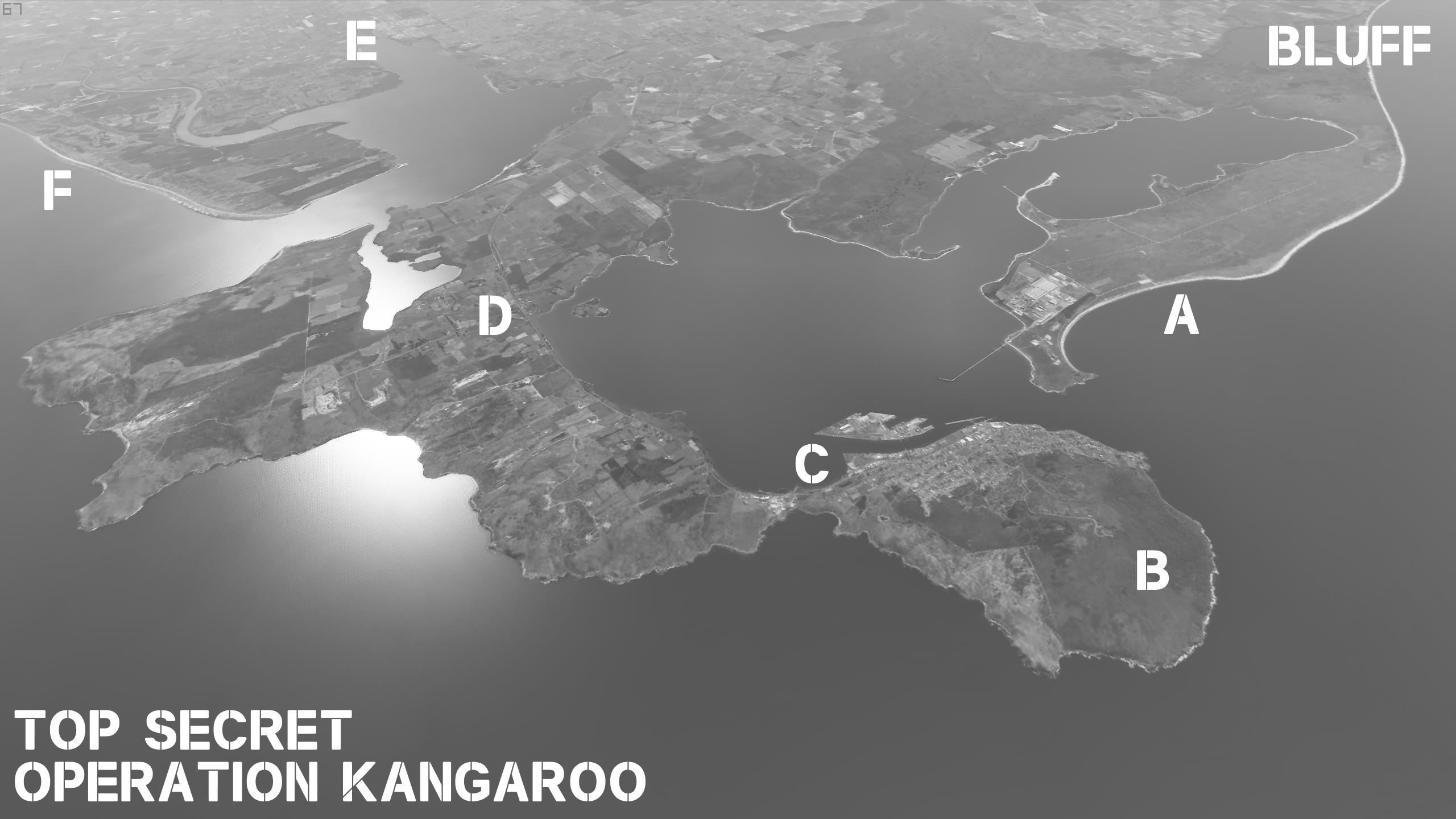 CAPTURE OF BLUFF AT POINT C IS CRITICAL TO THE SUCCESS OF HOP. POINT B SHOULD BE THE PRIMARY POINT OF BOMBARDMENT DURING LANDINGS IN THE BEACHES IN POINT A AND ELSEWHERE. FOLLLOWING CAPTURE OF BLUFF, POINT D SHOULD BE SEIZED AS SOON AS POSSIBLE, AS IT IS A CRITICAL RAIL JUNCTURE BETWEEN THE PORT AT BLUFF AND RAIL TERMINUS AT INVERCARGILL (POINT E). POINT F CAN BE CONSIDERED AS AN ALTERNATE LANDING SITE, BUT BECAUSE POINT F LIES WITHIN ARTILLERY RANGE OF STEWART ISLAND, THIS IS NOT ADVISED. 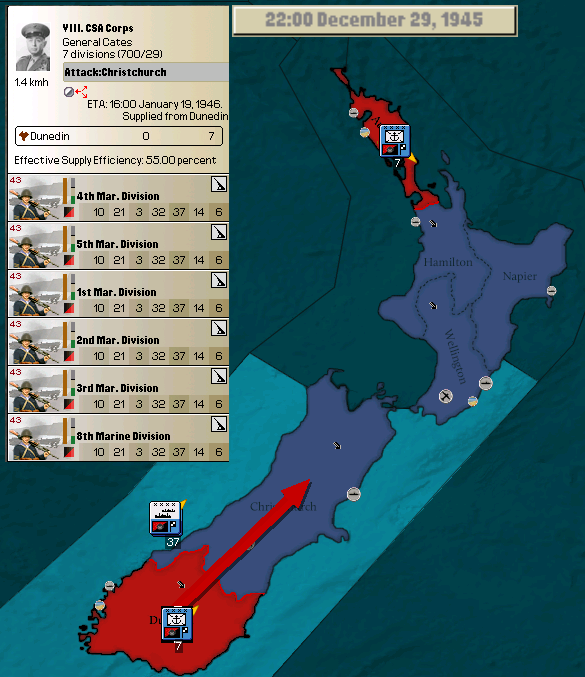 FOLLOWING THE CAPTURE OF BLUFF AND INVERCARGILL, FORCES SHOULD ADVANCE NORTH TO DUNEDIN AND CHRISTCHURCH. THE ULTIMATE GOAL OF OPERATION KANGAROO IS FOR THESE ADVANCES TO CONVERGE ON THE COOK STRAITS AND WELLINGTON. ~*~*~ “Queenstown station, please respond.” Silence. “Queenstown station, please respond.” Nothing. “Queenstown station, please respond.” Finally. Ella pulled back the throttle and took her P-67 Black Cat long-range fighter bomber down further into the valley. Here, nestled deep underneath the peaks of the Southern Alps, she was blissfully unreachable. Except by Adrienne, who coasted into formation to her right, in Chaton, her own Black Cat. Ella loved Adrienne with all her heart, enough to let go that she had named her plane Kitten. Ella didn’t believe in getting too attached to a plane and it was something she discouraged in all her students. When you personify a plane, you begin to trust it like you would a person. And that’s the problem. The Black Cat was a great machine, but it was still just that: a machine. Machines have hard limits. Adrienne was going to do what Adrienne does though. “I would love to start a school here.” Adrienne’s voice came through her headset. It sounded just as sweet to Ella as it had when they were first introduced at the Joint Training Academy in Wales. That was the voice that made Adrienne the favorite, back when the British and French media had done everything in their power to turn them into rivals. There was a storm of attention around their induction to the elite training program: which air force would generate the first great female fighter ace? Turned out it was neither the Republican nor the Communal Air Force. Between the hostility of their male classmates, the weight of national expectation, and the messiness of their initial affair, they both burned out and were considered mediocre at best. Britain and France treated them like disappointments. On the other hand, America was desperate for any pilots and welcomed them with open arms. There had been harrowing and dangerous fighting in all of America’s wars, but they never considered going back. Even when most of their fellow European volunteers had returned home to reap the rewards of their extracurricular service, Ella and Adrienne stayed right where they were. And now the shoe was on the other foot. It was America that had the best equipment, the amplest supply, the most available stations, and where merit could get you the farthest. She tried not to indulge her vindictive side too often, but it was hard not to laugh when she thought about some of the men who had laughed at Ella and Adrienne’s American deployment. They assumed these upstart women would both be dead in Maryland within the month. Now some of them were frozen out of the Republican Air Force due to suspected Laurentian sympathies, or they had had their units disbanded due to supply shortages as the depleted Commune sought to keep half a continent fed and content. Adrienne had badgered Ella to stop being petty, so Ella wasn’t gleeful at their misfortune, as she once would have been. But she also didn’t bother trying to work up any sympathy for them. After all their big talk.  “Don’t you agree, Ella?” “Oh, um, yes. Wait, what?” “You are not even listening to me!” “I’m sorry.” “What is on your mind, dear? Don’t tell me it’s nothing.” “I’m just thinking about what comes next.” A white lie. She didn’t want to admit that she was thinking about those who had wronged her again. Adrienne would chastise her for it. “How do you mean? We’ll finish up this tour and then start the school, like we said we would.” “Right, right, but before that. When does this war stop, you know? That’s what I’m thinking about.” “For us, it will stop when this tour is up. Like we agreed.” Adrienne always spoke tersely about this topic. Ella picked the wrong white lie. Adrienne didn’t want to talk about this. Whether they were out on the front lines fighting, or rotating back to America to train new pilots, war had consumed most of their adult lives. 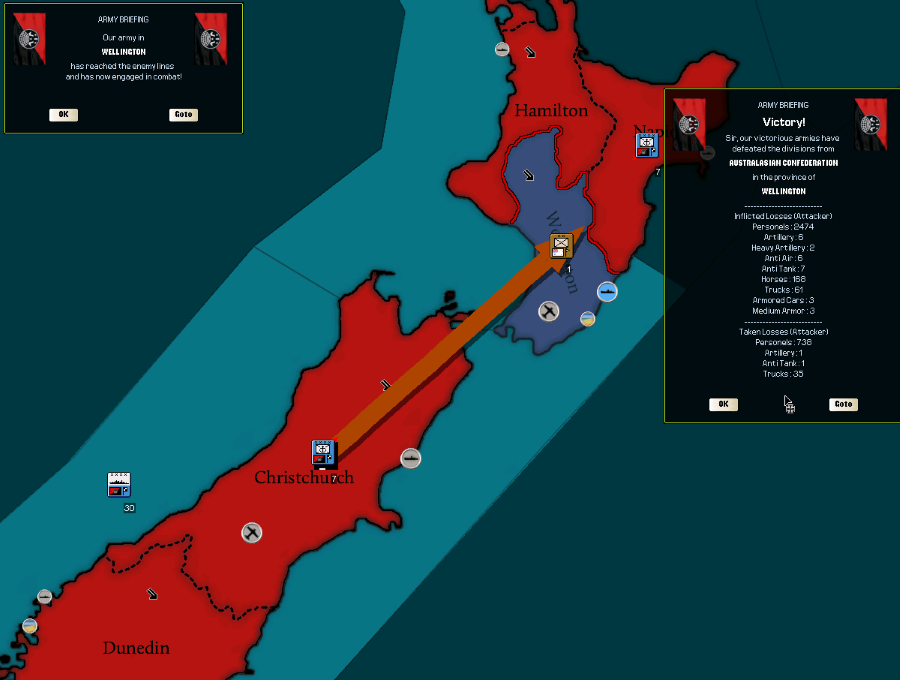 There was no thrill to it anymore. Ella had agreed to another frontline tour she had seen the casualty reports of her own students being killed. To retire, to give it up and live a life of peace while war was still going on? That would be putting somebody else in the line of fire. And Ella couldn’t have that, because Ella wanted to protect everybody that she could. The novice and journeyman pilots replacing the retiring old guard would perform better if they were side by side with the best pilots in the world. Adrienne, on the other hand, had been mentally checked out of the war since the British Civil War at least. She had signed up for this tour because Ella wanted to, on the condition it would be their last. And now Ella was losing her passion for the fight too. It occurred to her just recently how over it she really was. As two great columns of Marines bore down from north and south to crush the vastly outnumbered Australasians in Wellington, Ella had been patrolling the Cook Strait and had caught sight of some ships moving to the west. 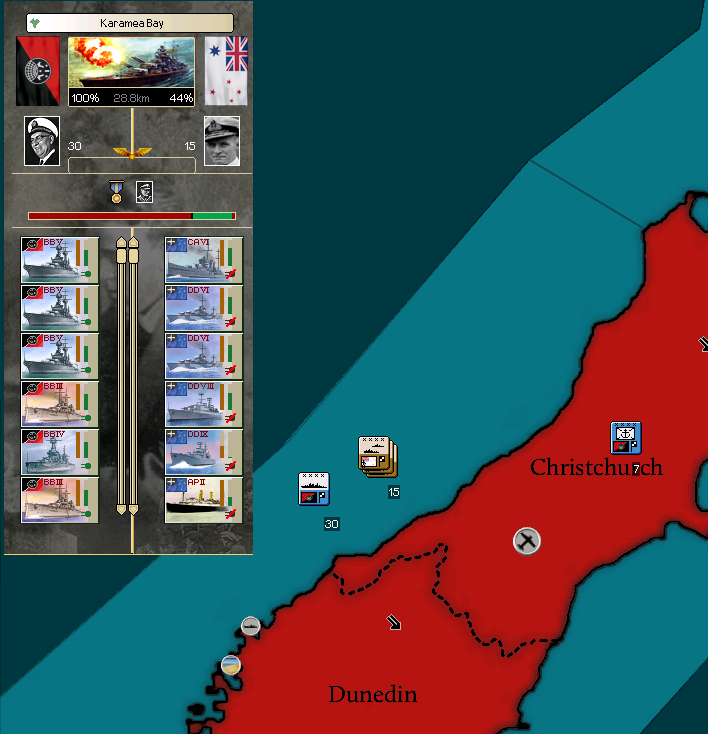 She radioed in the report and heard the news the next day that they had been set upon by the fleet. 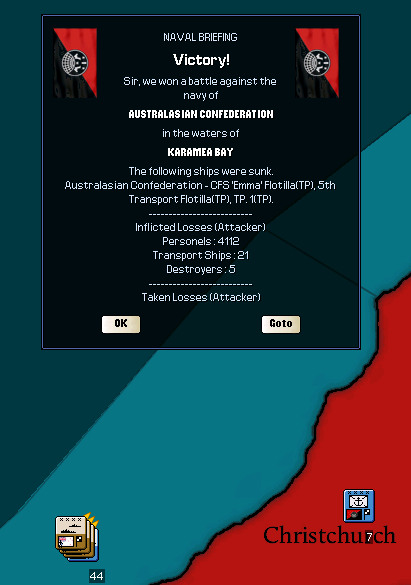 Twenty-one transports and five destroyers were sunk. Ella had been lauded for the catch. And she supposed it was deserved. These were enemies who would have to be defeated one way or the other and sinking them at sea was better than having to fight them on the beaches of Australia or the jungles of New Guinea. 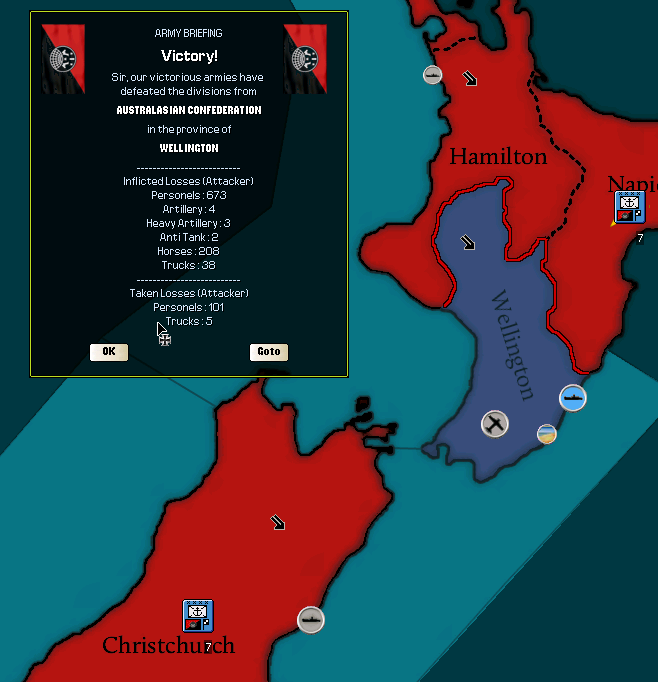 But that was the problem. She wasn’t being lauded for some honorable duel or heroic defense. She had simply pointed a battle fleet at a soft target. That was what all these campaigns had turned into. Enormous numerical and technological advantages, vast armies and armadas combing the land, seas and skies looking for something to destroy. That was how the two best fighter pilots in the world ended up assigned to a pointless patrol looking for retreating forces that everybody knew didn’t exist. The American military had an embarrassment of riches. There was no longer any sense that they were standing toe to toe with titans, keeping capitalist villains from strangling the revolution in its crib. Now it was just about wiping out the last few enemies still willing to stand up and fight against the red goliath. Some of the novice pilots that Ella was here to protect resented her and Adrienne for not stepping aside and letting the young guns get more glory. It was a far cry from the days when the Syndicate Air Guards fought for their lives over the Chesapeake Bay against what seemed like the entire world. It had all become so careerist and methodical. 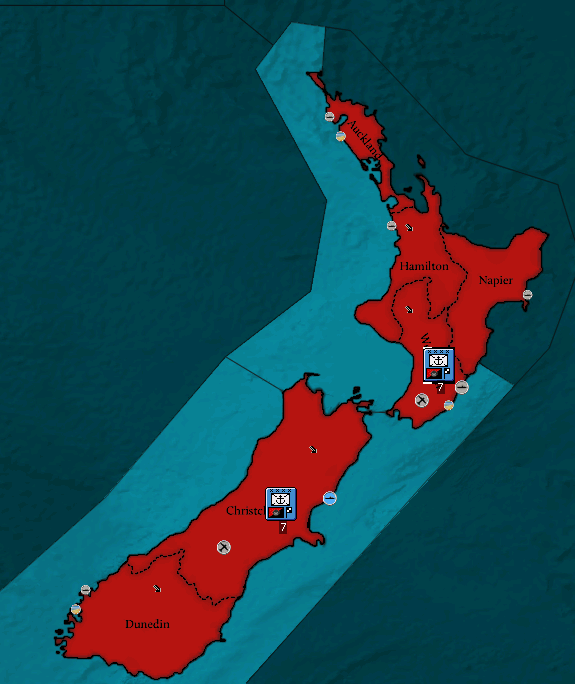 Ella sighed. “Ella, please just try to relax. How often do we get to fly peaceful skies together?” “Yes, yes. I look forward to when we can do this all the time.” “Me too, ma chérie.” The pair swooped over a pass into another valley. It was hard not to notice a burned-out patch of forest, with a wrecked plane lying in the center. It had to have been an Entente one. American carrier air groups had descended upon New Zealand like locusts, and desperate Entente pilots stuck in the air tried to lose their pursuers in the mountains. They had been chased down and obliterated. The American fighters were too fast, too agile, too well armed. The Entente were still flying the same planes that they had used to defend Canada five years ago, and a lot of those planes had been outdated then. Canada was the heart of the Entente’s aircraft production, and the Red Army had ripped that heart out at the outset of hostilities. “What a shame that we only manage to visit new places when we’ve just conquered them. Wouldn’t it be nice to just go somewhere only to see it?” 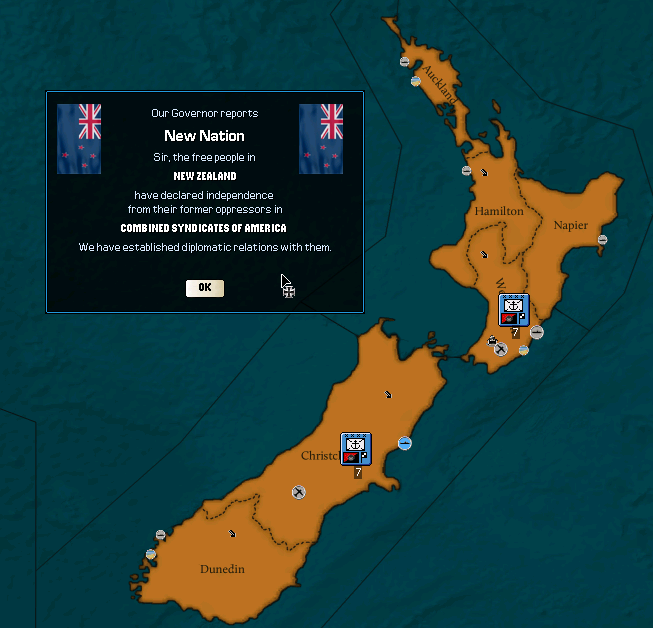 “Hm. I suppose I should wait to how these places I love to fly in take to syndicalism before I fantasize about starting a flight academy here.” 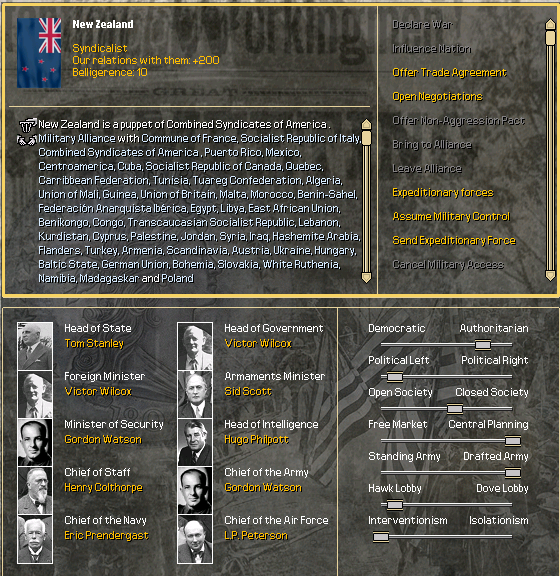 Ella didn’t know who was going to be installed in a new government for New Zealand. She kind of didn’t care. It was just another place she had flown and fought. Albeit an incredibly beautiful one. These Southern Alps did remind her of their namesake in Austria. Though she had more time to appreciate these. There were no anti-aircraft guns in each valley waiting to light up unsuspecting Internationale flyers. Enough, Ella. Stop thinking about the loving war. Have some fun, for God’s sake. “I think New Zealand might be too remote for it. And it doesn’t get hot enough down here for my tastes. I still think Hawaii is a good choice. We should go back there when the war’s over, see how we like it.” “I’ll hold you to that.” “What if we became barnstormers? Fancy practicing some stunts?” Ella looked over to Adrienne to her right, who looked back with wide eyes. “I swear if you have a hundred and seventy victories and die doing something stupid like that…” Ella pulled into a climb. She wasn’t going to actually attempt a loop at this low altitude, not in the beefy Black Cat, but she wondered if she could get Adrienne to yell at her. It was cute when she yelled. “Queenstown patrol, please respond.” the radio crackled. gently caress. Too high. What do they want? Ella leveled the plane out. “Queenstown station, this is Queenstown patrol.” Adrienne sighed over the radio. “Good. You’re not dead. There are reports of an enemy fleet 75 knots north north west of Martins Bay. We need you to range out and verify the report.” Ella looked around her. It was a beautiful day and it would be quite easy to verify the report with such great visibility. “Queenstown patrol, please respond.” “I… um. Unable to do that, Queenstown station. Insufficient range.” “Are you sure?” “Positive. We’ll be turning back soon.” “Well… Roger that. We’ll send another group.” 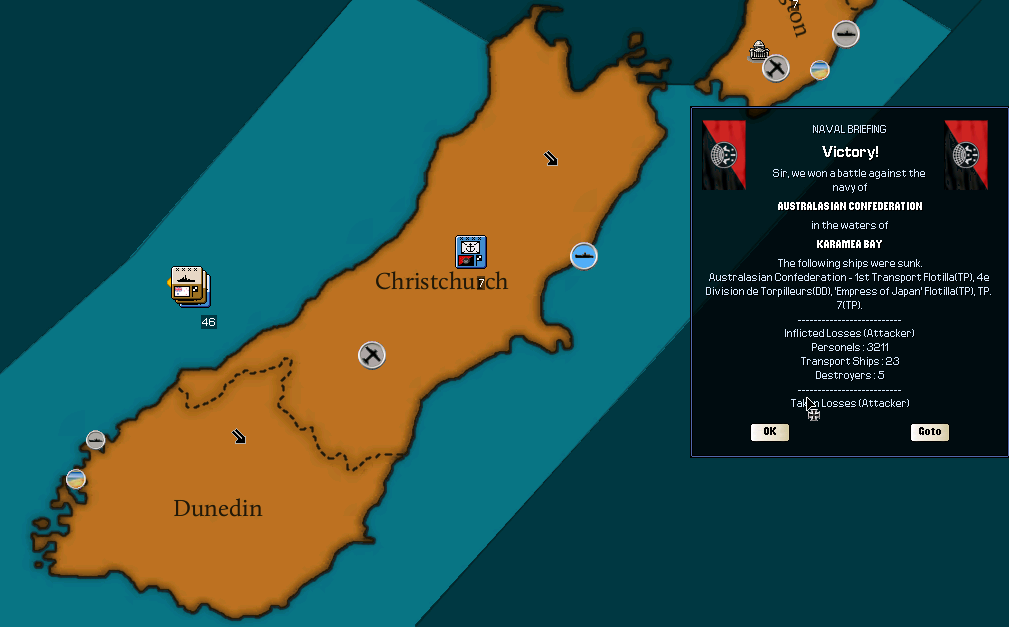 Ella dipped back below the peaks and fell back in line next to Adrienne, who wore a smile more beautiful than any snowy peak or verdant valley. “Thank you, love.” War had swallowed a decade of their lives. But it would not have today. Today belonged to them, and them alone.
|
|
|
|
If you couldn't tell between the images and the flight themes, I've been on a big time Flight Sim kick lately. I figured it'd be fun to try and add a bit more operational detail than what the game map provides. I don't expect to use it often, especially because the imagery is of 2014 and not the 40s. Hopefully it adds something different, especially when in OTL the details of landings are such a big part of World War II popular imagination, but they come up in these games as basically just a slider moving back and forth if they're opposed at all.
csm141 fucked around with this message at 02:23 on Sep 15, 2020 |
|
|
|
I was trying to figure out what that was- too nice for Google Earth. Happy to see a new update so quickly!
|
|
|
|
I have had this thread bookmarked for almost six years now and I do not regret it.
|
|
|
|
Man I had dread the whole time that one of them was about to bite it and I’m glad they just got to fly around New Zealand instead 
|
|
|
|
So is there a reason that Russia and Japan aren't burying the hatchet? Come to think of it, what is the Russian diplomatic stance towards the recent crushing wave of Internationale victory?
|
|
|
|
Lustful Man Hugs posted:So is there a reason that Russia and Japan aren't burying the hatchet? Come to think of it, what is the Russian diplomatic stance towards the recent crushing wave of Internationale victory? Russia had Siberia successfully break away so they're pretty much out of Asian politics. They're just chilling over there. I can't imagine they're happy about goings on but they had a rough go of it early on and they're probably more concerned about an aggressively expansionist Turkestan to the south.
|
|
|
|
As for Siberia, last time I looked they had a left of center government so they're probably friendly ish with the Internationale. And Japan's suzerainty of Transamur would be a bigger sticking point for them I imagine.
|
|
|
|
Chapter Twelve: Expanded Horizons (World Summary: 1946) From the Chicago Proletarian: Guide to 1946 Special Edition (If you click the world maps, you can open a high res version that’ll let you discern more details. Thanks to u/Lowtuff for providing the map I used to make these. I definitely didn’t fill out every single small island correctly because I was starting to lose my mind so if something seems weirdly colored, it’s probably wrong and I forgot to change it. I can’t get access to this save game anymore because it’s on a pretty old version of KR and a pretty old version of DH so this update is made from my memory and is intended to summarize events and answer questions about the state of the world. If you’re wondering who the president of Venezuela is, I can’t find that answer for you anymore. I do broadly remember the state of most countries, so ask if you’re curious, but I can’t guarantee an answer.) Part One: Conflict and Diplomacy in 1946 Since the revolutions in Britain and France began to move the socialist movement into the realm of statecraft and war making, the Internationale has seen its influence expand massively. 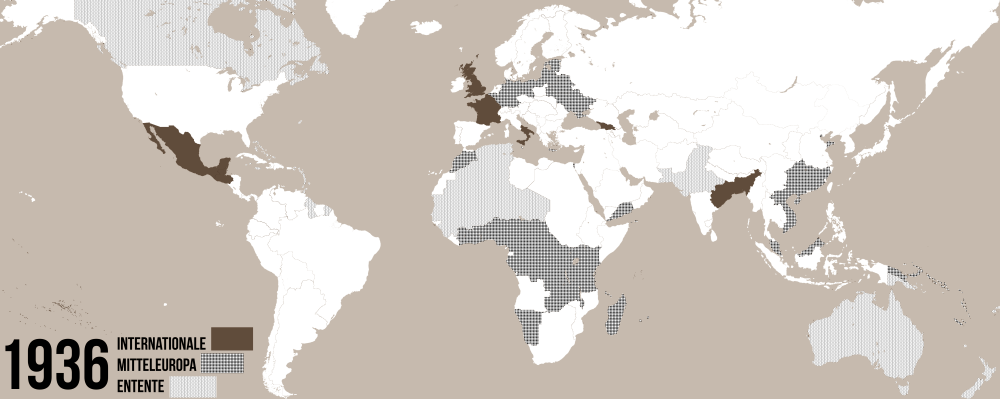 Ten years ago, the Internationale was small. The organization was more powerful than ever after seizing control of the industrial centers in France and Britain, but economic hardship followed as the nations continued their painful adaptation to living without the products of empire. The alliance’s expansion to include the socialist states in Bengal, Georgia, Centroamerica and Mexico did some to alleviate these problems. However, unless something major changed, the Internationale was always going to be hamstrung by their lack of access to natural resources relative to the Entente and Mitteleuropa. Something major changed in November of 1936, when MacArthur’s intransigence instigated a civil war in the United States. The entire world, which had learned to regard the United States as an ineffectual and irrelevant actor on the world stage, suddenly saw the potential of the enormous country. Volunteers and military equipment poured in from every major power in the world. The Entente seized New England and funneled materiel into Norfolk and across the border with Canada. German convoys delivered modern equipment to New Orleans and Miami, and socialist cadres flooded into New York and Philadelphia. Japanese units sailed to San Francisco to help the Pacific separatists establish a new nation on the West Coast. All of these nations were eager to test out their most modern equipment against the best their future enemies had to offer. Ultimately, the number of enthusiastic volunteers and the control of the most important industrial centers gave the newly formed Combined Syndicates the advantage, and by June both the federal government and Atlanta-based Union State had fallen to the socialists. Chairman Jack Reed guided the nation through its early days, including a military operation in 1937 to take back the Southwest and restore the recently couped socialist government of Mexico. In 1939, the Combined Syndicates signed a pact with Centroamerica, which included a military operation to seize the United Provinces and Honduras and connect Centroamerica’s two halves. The aggressive move outraged Canada and Germany, but both states were unwilling to start an open conflict with Britain and France, which had signed a formal alliance with the Combined Syndicates. This was merely a prelude to 1940, when a newly reconstituted American Red Army executed a lightning strike north from New York City into Quebec and Ontario, causing chaos in the Entente which allowed the socialists to successfully move across the Rockies and take the whole of the United States, other than its Pacific territories. This conflict also brought Cuba and the Caribbean Federation into the socialist alliance, and allowed Centroamerica to seize the Panama Canal, giving the socialists control of a critical waterway.  The beginning of open conflict between the Entente and the Internationale created a complicated situation in Europe, where France was now at war with the colonial regime in West Africa, while also being unable to engage them without creating an opening for Germany to attack France itself. Therefore, the American Red Army was on the move again, moving an army across the Atlantic in secret, and invading Algeria and Tunisia from France’s southern ports. A risky expedition across the Sahara Desert brought the colonial regime to an end, but the execution of Napoleon in Dakar ratcheted up tensions across Europe. Germany seized upon the outrage of Europe’s conservatives to expand Mitteleuropa into the Prague Pact, a counter-revolutionary alliance that comprised most of Europe and threatened the Internationale on several fronts. The year between the summer of 1941 and 1942 was a year of tension and anxiety, as huge armies lined up against one another across Western Europe, awaiting the order to go to war. But the first shots were not fired in Flanders, as expected. Instead they came in Andalusia, as the American Red Army invaded the neutral state of Spain, which was in the midst of a brutal civil war. The Internationale had an aggressive plan. It combined the age-old Anglo-French of a pitched battle in Flanders with a bold American plan to seize Gibraltar and the Suez Canal, and thus the entire Mediterranean. The hope, and eventual outcome, was to cut off Germany from its allies and open new fronts against them. Indeed the lion’s share of the intense battles and dying in the war took place not far from the killing fields of 1917, while the mobile American army swept across the Mediterranean and Africa, eventually opening a second front against Germany via Austria. The added pressure presaged the collapse of Germany’s position in Flanders, allowing the French army to sweep across all of Central Europe in a few short months. The struggle against the imperialists suffered a setback mere months after victory against Germany when the Laurentian counter-revolution gripped Britain. After a brief but bloody intervention to push back the monarchists, American forces shifted focus to the Pacific, beginning with the invasion of Oahu in February of 1945, of the Gilbert chain in June, the Carolines in July, Fiji in November and New Zealand just days ago in December. The Army reports that it expects to have control of both main islands of New Zealand by the end of January.  And thus, here we are, in the year 1946. The Internationale has gone from being embattled and isolated to controlling most of three continents. The alliance is now dominated by America rather than France and Britain. New powers in Italy, the African Union and Mexico are becoming more assertive. And yet, much work remains to be done. Conflicts continue to rage around the world, even if they are farther from our view than previous ones. The British and German emperors have yet to be brought to justice. Large numbers of workers and peasants remain under the yoke of repressive regimes. Join us as we take a tour around the globe and explore the issues and conflicts that could dominate the headlines of tomorrow. 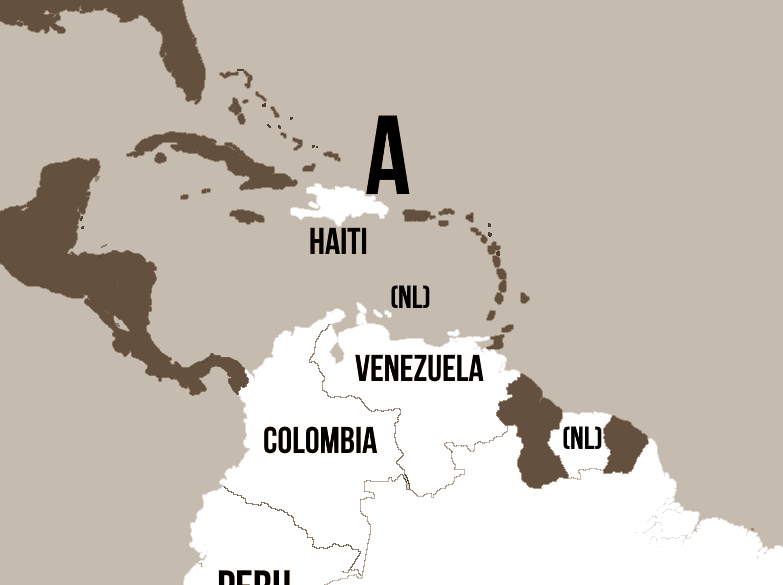 A: THE ISLAND FORTRESS OF HAITIAN HISPANIOLA When the revolution swept through the Caribbean, it skipped over Hispaniola. A war erupted in 1937 between Haiti and the Dominican Republic over the latter’s attempt to evict all Haitians from its territory. Haiti came out victorious and annexed the entirety of the island. Now it is the most militarized island in the Caribbean. While the rest of the islands in the Caribbean forge deep bonds with the rest of the OAS as well as the African Union, Haiti maintains an isolationist armed stance. Red Army intelligence estimates that there are twenty divisions deployed in defense of the island, with an ever-growing network of fortresses and tunnels through the mountains in the interior of the island. While it is determined to resist any military aggression, Haiti is far from an autarkic hermit republic. It is under no embargo, cooperates frequently with the Caribbean Federation and trades freely with all states. Relations with America itself are more distant, as both the Haitian and Dominican populations have painful memories of American occupation in decades past. The Gitlow administration keeps a close eye on the activities of Haiti but seems content to let the nation lay so long as it doesn’t engage in counter-revolutionary activity against its neighbors. 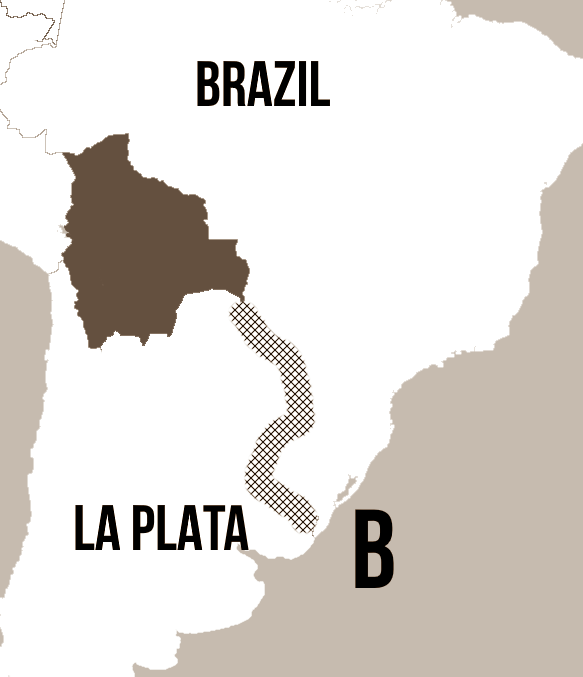 B: THE WAR IN SOUTH AMERICA The war between Brazil and La Plata drags on with no resolution in sight. La Plata has advanced into Brazilian territory but has consistently struggled to advance much farther north than Porto Alegre. The rival right wing states have rebuffed all American offers to negotiate a settlement, and other powers are hesitant to become involved lest they run afoul of the Reed Doctrine. The Gitlow administration has no official position on the war except for generally condemning it and that any violation of Bolivian neutrality will be met with a military response. However, this situation may one day involve the socialist alliance, as the burdens of war and loss of trading partners has increased radical feeling in both Brazilian and La Platan populations. Military intervention by the Internationale may then be necessary should the war change from an intra-bourgeoisie affair to one where there is a clear way in which military action may help the working classes. 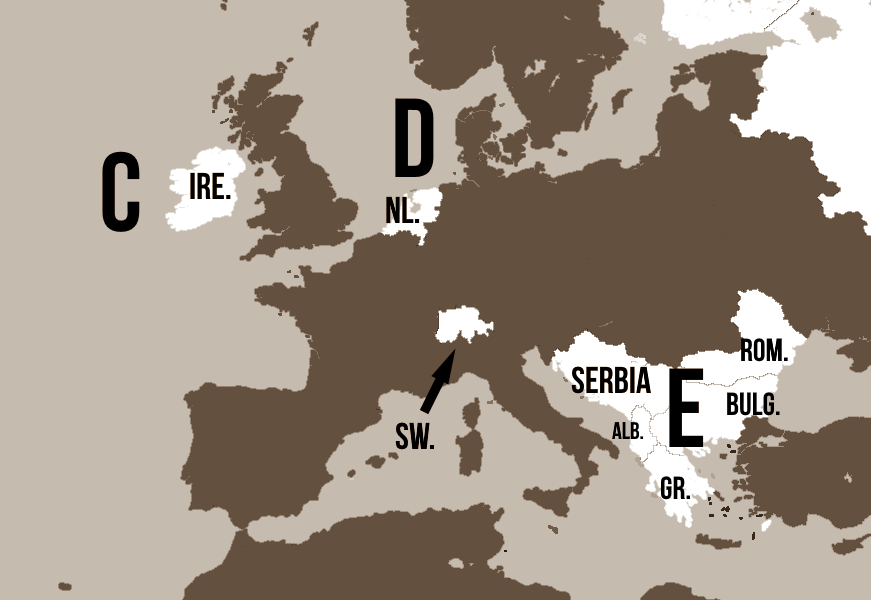 C: THE IRISH QUESTION The Collins regime in Ireland continues to endure despite being so close to a hostile great power. It maintained its neutral position throughout the wars despite many offers of recognition from the British Empire and offers of assistance from the German Empire if it would join the war against the Internationale. Its future status is a major sticking point between the major powers in the socialist alliance. Britain, reeling from the Laurentian counter-revolution, believes that Ireland was somehow involved in the plot and that a hostile posture is appropriate. France is much less aggressive, seeking to pressure the Collins regime to break down some of its barriers and to improve the situation for Irish workers by leveraging the Internationale’s economic preeminence, in what is increasingly being referred to as “the Dutch approach” (see section D). The Gitlow administration, which relies on the political support of millions of Irish immigrants and their descendants living in America, remains insistent that Ireland should enter the socialist alliance on its own terms or not at all, a stance that the Britain government finds hypocritical, given that America has forcibly removed capitalist regimes in every one of its neighbors and a few dozen other states. Proposals to improve bilateral ties between Chicago and Dublin are plentiful. There are reports that the two sides are close to an agreement to open their borders once again, and that a proposed air route connecting North America to Europe via Newfoundland may have a stop in Ireland as well as socialist Europe. While a thaw between Chicago and Dublin is good, true lasting peace and prosperity in Ireland necessitates Dublin and London finally hashing out their differences, something that seems no closer today than ten years ago. D: DUTCH DECOLONIZATION Unlike Ireland, the Netherlands is led by a left of center party, which has allowed for a much smoother relationship with their socialist neighbors. The Dutch Labour Party is politically beholden to trade unions, which makes it simple for the government to agree to Internationale demands that all trade goods sold to Internationale nations be produced by unionized labor. Indeed, many influential trade unions within the nation are fully affiliated with the Internationale and some public sector industries (such as transport) have become fully worker owned and managed. Nevertheless, the Netherlands remains primarily a capitalist and imperialist nation. Its holding of colonies and the presence of a monarch disqualify it from full Internationale and European Union membership no matter how close it may become with its neighbors or how many left wing reforms it implements. Queen Wilhelmina is said to despise the Internationale. Many on the left seek her immediate removal, while the official policy of the Labour Party is that they will hold a referendum on whether to become a republic upon the Queen’s death or abdication, essentially kicking the contentious question down the road. Most importantly, the Internationale demands the end of the Dutch colonial empire. The invasion and forcible integration of Portugal in order to put an end to its colonial empire added further urgency to this issue, and now there is broad support for granting independence to the colonies. Negotiations for this in the Netherlands Antilles have been complicated by issues surrounding compensation for the expected expropriation of Dutch citizens’ property, and whether the colonies will retain the Queen as a head of state. The situation in the East Indies is much more complex, and is covered in section K. Despite all the leftward movement in recent years, the government remains wary of inciting right-wing violence by moving “too far too fast.” E: BALKAN STATES Other than Russia, the largest portion of Europe not within the socialist alliance are the Balkan states: Serbia, Romania, Bulgaria, Albania and Greece. These five states have right-wing governments and are all generally opposed to the Internationale. However, they were not included in the Prague Pact for the same reason that they do not pose a united threat today: they do not get along. Each of the five states has territorial disputes with at least one of the others and they have fought four wars amongst themselves in the last fifty years. Additionally, still young socialist regimes in Turkey and Hungary have an array of issues with these states, including Romania’s claims on Transylvania, and Greece’s claims on the Aegean islands and Crete. Of the five states, Greece has the least tense relationship with the Internationale. Crete, formerly a German puppet state, remains under socialist occupation and the citizens there have petitioned for reunion with Greece. However, the French occupiers are demanding a more comprehensive treaty with Greece that will increase the influence of unions and the left in that nation in exchange for a return of Crete, and perhaps some of the Turkish held Aegean Islands as well. No notable diplomatic initiatives have been undertaken with any of the other states. However, if there is another Balkan War, it will surely necessitate some form of response lest a humanitarian crisis develop on socialist Europe’s southeastern edge.  F: THE HORN OF AFRICA With the destruction of the Portuguese Empire, all of Africa is now part of the African Union and the socialist alliance. Except for one state: Ethiopia, which has managed to resist all manner of foreign domination even as the rest of the continent was invaded by Westerners, once to colonize and then again to liberate. The African Union is insistent that Ethiopia is entirely its concern, and that no European or American involvement in AU-Ethiopia relations is welcome. The African Union, poor in industry but increasingly influential politically, seeks to make its own waves and so Ethiopia may be invited to integrate with the rest of the continent economically even if it doesn’t fulfill any of the criteria to be a member of the Internationale. Pan-African unity is a primary policy objective of the AU, and it remains to be seen how successful this sort of nonpartisan approach will be. Across the Red Sea, Yemen and Oman are more independent than they have been in centuries. The Portuguese, British and Germans have all come and gone. Arabia to the north has a socialist Internationale-affiliated government, but Bedouin groups continue to roam the interior as they always have, and Yemen and Oman have become sanctuaries for those unhappy with the socialist regimes in the Arab world. Additionally, both nations have sought to improve ties with Turkestan to the north. While it seems unlikely that they will be become great hostile powers, they do provide potential base areas for other hostile powers. G: THE ASTRAKHAN STALEMATE A state of war persists between Turkestan and the Don Kuban Union, even as Turkestan has ballooned in population and power by taking control of Persia and northwestern India. Turkestan appears to not have a great interest in breaking through the line near Astrakhan. Skirmishes are frequent but rarely change the situation in any lasting way. However, should the Turkic armies fully commit to breaking through then socialist Europe will find itself right next to an unfriendly power. The Transcaucasian Union to the south has previously expressed its aims to incorporate all of the DKU’s territory, but it finds little support for this endeavor outside of Ukraine, who would prefer a socialist neighbor to its east. H: TURKIC INDIA Military planners in Chicago had a problem taken off the board when a disagreement over Afghanistan brought Turkestan and the enemy state Delhi into war. With Delhi’s powerful allies being smashed by the Internationale, Delhi found itself helpless against the onslaught. However, this has brought a new problem. All of the socialist alliance recognizes the claim of the Calcutta-based Bhartiya Commune to be the sole legitimate government of India, which includes all of the Turkic territory southeast of Afghanistan. Turkestan is perhaps most shielded from the Internationale of any country in the world. The logical base areas from which to launch an invasion are Iraq and Bhartiya. The latter remains at war with the Princely Federation (more on this in section I) while the Iraq approach would require the invaders to cross multiple forbidding mountain ranges. Whatever approach is taken, the invaders would then have to drive deep into an underdeveloped and hostile Central Asia in order to truly defeat Turkestan. Without local allies or the cooperation of Russia, such an operation would be costly in lives and require complex logistics. The Bhartiya Commune has not made any indications that it seeks assistance against Turkestan, or even against the Princely Federation it is currently at war with, and so it seems this state of affairs is likely to persist. I: THE EASTERN GHATS LINE The Bhartiya Commune, second only to Indochina, has remained the most distant member state of the Internationale. The Bhartiya Commune does not seek military assistance but does accept economic and technological aid. Partially because of this, the war against the Princely Federation has been slow going. The socialists have advanced past the initial border, but fighting has been bogged down in the Eastern Ghat mountains for many months. Both sides remain wary of Turkestan to the northwest, and overextension against the enemy may invite Turkic hostility, if only in the form of undeclared raids. It is likely that if the tide turns against Bhartiya, then they would surely call for aid from America. 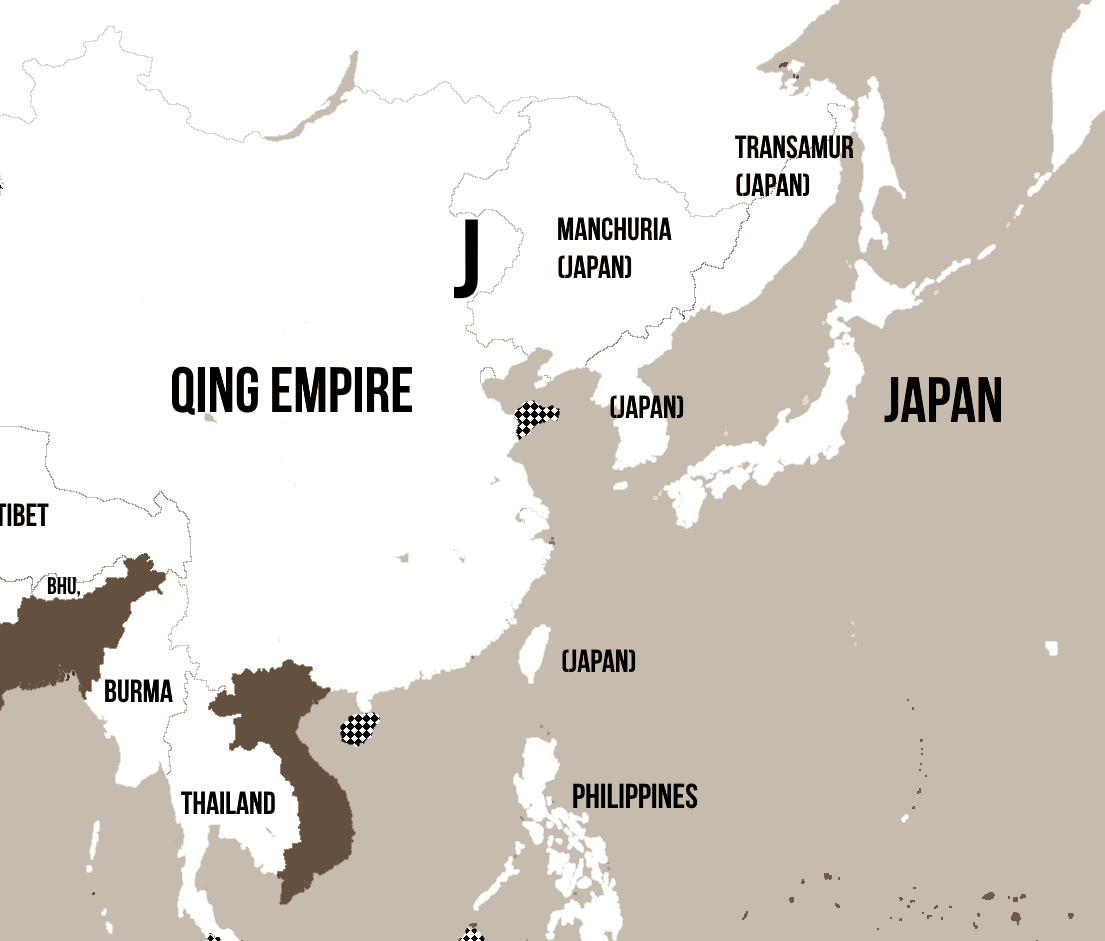 J: MANCHURIA The Qing Empire has undergone a tremendous resurgence, taking advantage of German misfortune and Japanese isolationism to reclaim most of the territory it once held. The tables are turned, and the German imperial bastions in China fear the day that the Qing empire will arrive to take them back. But most importantly, Qing’s resurgence brings it into increasing contact with the Japanese empire. The Qing claim Manchuria, Formosa, and Transamur as part of its territory, and believe they are entitled to suzerain status in Korea. While Japan has the industrial advantage, Qing China has a much larger population and does not require control of the seas to supply its front in Manchuria. A war between these two would decide the fates of millions and millions of people, and the Internationale must surely take notice, if only to ensure the security of Indochina and Bhartiya, as well as that of the friendly social-democratic regime in Siberia. 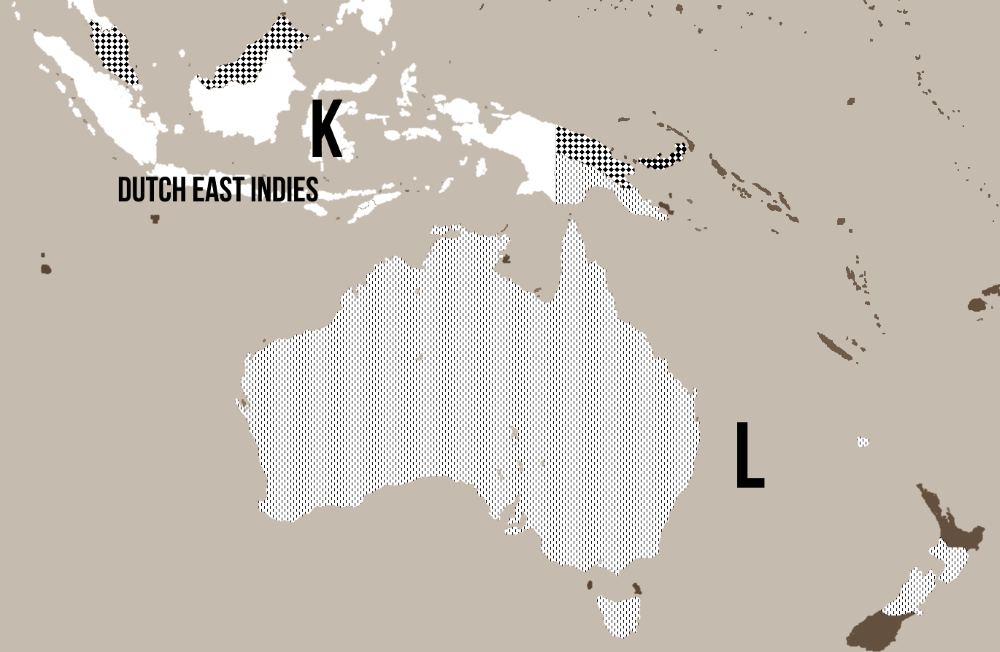 K: THE DUTCH EAST INDIES While the Dutch East Indies remain a colony of the Netherlands, it is all but guaranteed they soon will not be. Which leads the powers in the Pacific to have an intense interest in their future. Chronically resource-starved Japan has been purchasing Dutch interests in Indonesian oil at a rapid clip. Qing China seeks allies and buffers against American encroachment. America believes that capitalist liberation is no liberation at all, and that no resource in Indonesia should be owned by a foreign company. There is broad domestic support for independence, and an uprising would sweep away the Dutch regime quickly. However, the independence movement is looking past the Dutch towards the question of what kind of state an independent Indonesia would be. Socialists believe they have the long-term advantage, believing that the Internationale will arrive to occupy German positions, thus giving the socialists a trump card of having powerful foreign allies based nearby in Singapore or Brunei. More Japan-friendly conservative factions believe that rumored quadripartite talks in Tokyo between the Qing, German, Japanese, and British empires will result in a new order in East Asia that will secure them against American naval power. Whenever one of these factions believes it is in their interest to push, the Dutch house of cards in Indonesia will surely fall. L: WILL WE INVADE AUSTRALIA? The Gitlow administration has been noticeably quiet about its long-term military aims in the Pacific region. Now that the Entente has been forced far away from the Americas, the question remains if the war will continue until the bitter end or if a negotiated settlement is in the cards. Australia has been badly battered by repeated naval expeditions and no longer poses a threat outside its borders. The invasion of New Zealand just days before this issue went to print has changed the situation dramatically. The American military now controls several suitable launching points for an invasion into Australia, but the Gitlow administration still has not committed to much except a promise that the German Empire would be fully extinguished, which implies an invasion of New Guinea is guaranteed. But how much farther will our armies go? An invasion of Australia would be the end of the British Empire, an eternal foe of socialism, but it would give the socialist alliance yet another battered continent it is responsible for feeding and securing. Unlike the others, this one would be majority-populated by hostile conservative whites, rather than previously colonized peoples, complicating the matter of how to administrate such a place. On the other hand, a peace settlement that allows Australia to persist outside the socialist sphere of influence may lead to an alliance with Japan, giving Japan bases it needs to exert influence over the future of the East Indies, and minerals it needs to feed its industry. The Internationale, and Indochina in particular, seek to contain Japanese influence. It is a tricky situation, and despite the years of lead and blood behind us, it is obvious that there remain some more ahead of us. Now that we have explored conflict and diplomacy, what will 1946 bring us in the world of American Politics, Sports, Technology, The Arts, Culture and Literature? Each edition of the Proletarian this week will go in depth into one of these topics. We hope you will continue to read.
|
|
|
|
Great framing device + work on the maps, CSM. You are really in this for the long haul.
|
|
|
|
Really enjoyed this nice overview, helped put things back into perspective!
|
|
|
|
What's the status of Peru, Venezuela, and Colombia?
|
|
|
|
paragon1 posted:What's the status of Peru, Venezuela, and Colombia? Peru is the biggest power in that region and is either Social Conservative or Authoritarian Democrat. Colombia is their puppet and is Social Liberal. On that map Social Conservative Venezuela is missing their half of Guyana that they demanded from the Caribbean Federation. They have claims on Aruba and Curacao but have never done anything about them.
|
|
|
|
Chief Savage Man posted:Peru is the biggest power in that region and is either Social Conservative or Authoritarian Democrat. Colombia is their puppet and is Social Liberal. On that map Social Conservative Venezuela is missing their half of Guyana that they demanded from the Caribbean Federation. They have claims on Aruba and Curacao but have never done anything about them. Doesn't Venezuela also have a land dispute with the Dutch?
|
|
|
|
Chapter Thirteen: The Canary In The Teamster Hall (February 1946) WILD BRAWL OUTSIDE BELOR-NESS HALL, GUARD CALLED IN FIVE HOSPITALIZED, ALL EXPECTED TO RECOVER Minneapolis Daily Star, February 15, 1946 An uncontrolled melee poured out of Belor-Ness Hall and onto Hennepin Avenue last evening, injuring five before being shut down by the Red Guard. Multiple eyewitnesses reported to the Daily Star that the trouble began when participants in a routine Teamsters meeting had shots of whisky to celebrate a member’s newborn grandson. However, the participants continued to drink, and were, according to one witness, “sloshed” by the end of the meeting. 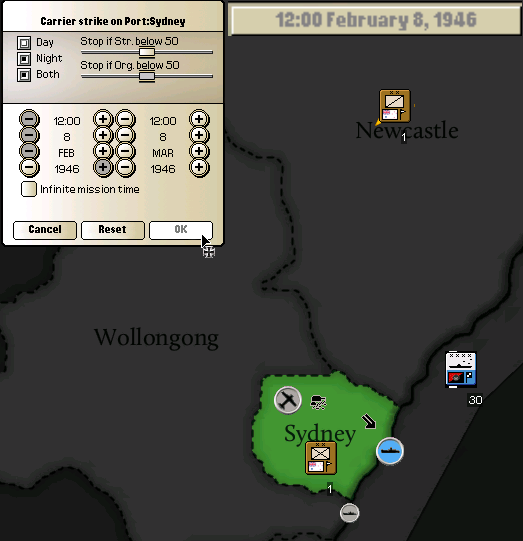 The kindling for the coming conflagration had been set, and the spark came when the presiding member asked for a voice vote on a resolution honoring Red Navy flier John Gustafson Jr., a Wabasha Teamster, who was awarded a Distinguished Flying Cross for bravery and skill during last week’s raid on Sydney harbor. 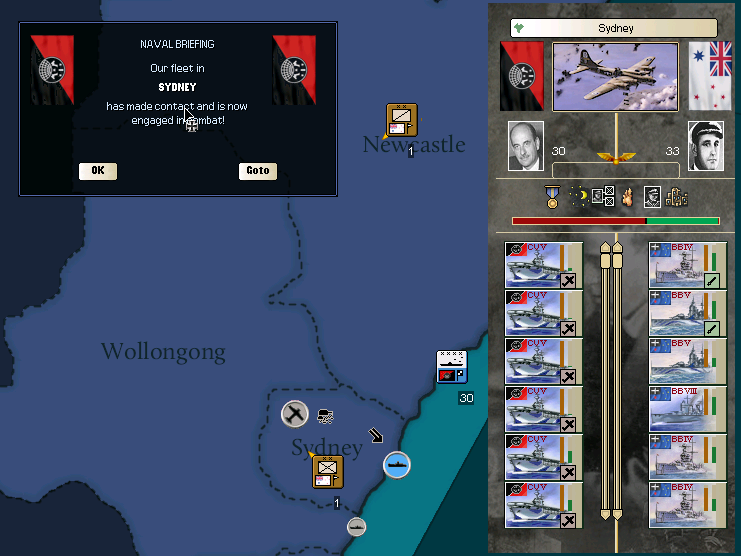 Accounts of eyewitnesses begin to vary at this point. What is known for sure is that somebody objected to what is normally a formality. Some claim that the objector insulted Gustafson’s heroism, saying that the Sydney raids were like “shooting fish in a barrel.” 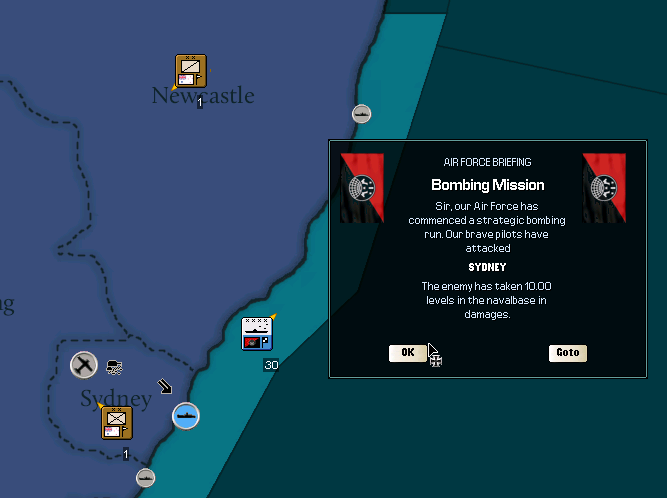 Others claim that the objector had a more nuanced complaint about how the Teamsters should not glorify the killing of their counterparts in the logistics industry of Australia.  The most likely of the reports to be accurate is the following: “Someone was yelling about how many people are dying, then all of a sudden, wham, bam, hooks and thrown shot glasses.” Regardless of the details of the inciting incident, the Minneapolis Red Guard began receiving calls about a fight outside on Hennepin Avenue. When Max Goldman, of the Minneapolis Red Guard, appeared on the scene, he found that the calls had underestimated the size of the altercation. “Due to the weather and darkness, the people on Hennepin Avenue mostly just heard a commotion of some sort. I was shocked to find that there were about forty to fifty people in the road fighting and blocking traffic.” Mr. Goldman said. Many of the brawlers were bruised or scratched and five men were sent to hospitals with broken bones. Mr. Goldman told the Daily Star that, according to his investigation, the injuries were primarily a result of the brawl finding its way into a large ice patch. “I’m sure it sounds like it was vicious, but it really was just ridiculous.” He also reported that a few men were already laid out grasping their extremities in pain when he arrived. Eventually twenty members of the guard were called in to secure the street and keep the warring Teamsters apart, and the street was again quiet by nine o’ clock. No criminal charges are being considered, and Minnesota Teamsters chief Ed Lacy, who was not present, told the Daily Star that the disciplinary committee will be investigating the incident thoroughly. Mr. Lacy had no comment when asked if this was a sign that the Teamsters were divided about the Australia war. The Minnesota Teamsters have been staunch allies of Foreign Minister Floyd Olson and have backed him up without reservation even as criticism mounts over the prosecution of the war. Mr. Olson is currently in Mexico City preparing for the upcoming five-power security conference, the pronouncements of which are certain to inspire further criticism from both hawks and doves. It remains to be seen if this incident is a sign of increasing dissent in Mr. Olson’s core of support. Perhaps we will know when the Teamsters meet again next Thursday. No alcohol will be served.
|
|
|
|
Short update, but the second half of this one is getting longer so it made sense to split this little bit off and just post it on its own.Lustful Man Hugs posted:Doesn't Venezuela also have a land dispute with the Dutch? Over Curacao and Aruba, yeah. I don't think they have a claim with Suriname.
|
|
|
|
Who's the Belor-Ness Hall named for?
|
|
|
|
Kavak posted:Who's the Belor-Ness Hall named for? A one-eyed giant of Irish myth and a lake monstse in Scotland, respectively.
|
|
|
|
Kavak posted:Who's the Belor-Ness Hall named for? John Belor and Henry Ness, killed by police during the General Strike of 1934.
|
|
|
|
csm141 posted:Short update, but the second half of this one is getting longer so it made sense to split this little bit off and just post it on its own. Gotcha. Also, how was that naval campaign so one-sided? Do you just have better ships, or what?
|
|
|
|
CVs, in general, kick the poo poo out of everything else and the AI doesn't defend effectively against port strikes. Basing planes in the same province as the fleet (I can't remember if they need to be set on Air Scramble) can de-org or even severely damage (if you have sufficient naval attack aircraft) port striking carriers. Strategia has long been brainstorming a rework of naval units which would including biasing carriers towards a fleet support role, making them sturdier but reducing their offensive stats.
|
|
|
|
Carrier brokenness has something to with the Engangement Range stat IIRC. A fleet will move towards the enemy until all capital ships are in range and then stop and begin firing- carriers have a huge range because of the planes, so an all-carrier fleet is going to be attacking any fleet that isn't all carriers and screens basically non-stop.
|
|
|
|
Unseen in these updates is that there's been huge sub stacks sinking convoys constantly and they just don't have the industry to keep up. My fleets are brand new carriers and heavy cruisers, their fleets are largely inherited junk from the rest of the Entente that soak up supplies. They're really decrepit by this point and it's mostly just due to the long distance and need to build up base islands and convoy stocks that they aren't being invaded yet. They've got nothing left.
|
|
|
|
csm141 posted:Unseen in these updates is that there's been huge sub stacks sinking convoys constantly and they just don't have the industry to keep up. My fleets are brand new carriers and heavy cruisers, their fleets are largely inherited junk from the rest of the Entente that soak up supplies. They're really decrepit by this point and it's mostly just due to the long distance and need to build up base islands and convoy stocks that they aren't being invaded yet. They've got nothing left. Historically accurate depiction of the U.S. Navy, then. The submarine service goes quietly unnoticed while absolutely gutting the enemy's ability to resist.
|
|
|
|
Kavak posted:Carrier brokenness has something to with the Engangement Range stat IIRC. A fleet will move towards the enemy until all capital ships are in range and then stop and begin firing- carriers have a huge range because of the planes, so an all-carrier fleet is going to be attacking any fleet that isn't all carriers and screens basically non-stop. Isn't this a reflection of the time, though? My understanding is that the great battleships of the Victorian and Georgian era were completely supplanted by naval projection of air power via carriers.
|
|
|
|

|
| # ? Apr 19, 2024 22:28 |
|
JustJeff88 posted:Isn't this a reflection of the time, though? My understanding is that the great battleships of the Victorian and Georgian era were completely supplanted by naval projection of air power via carriers. Yes, but it's a little bit messier than this. It kind of reflects reality but not really. Both fleets have positioning values which are dependent on a number of things, one of which is fleet speed. So, the fleets both try to move in to an optimum position - for a SAG with a lot of BBs, this is probably ~20-30km, for a CBG it's like 180km or whatever. Then both fleets maneuver for position with the SAG trying to close the range, and the CBG trying to keep the range wide. The problem is that CVs are relatively fast, and so an all CV fleet with similar screens has a speed advantage over an all BB fleet, so provided there's no visibility or bad weather disadvantage, the CBG can pretty much dictate range. This isn't fully realistic because an actual CBG is dependent on windspeed and direction to effectively fight, so it couldn't just keep running away and keeping an optimum range. Adding escort carriers to your SAGs in HOI2 allows them to close the range through some mechanic I don't really understand (For a while it was bugged and SAGs would instantly close the range to optimal and then wreck CBGs, that was funny).
|
|
|






















